#and have the earlier one now take on more meaning with the context and comparison of the later
Explore tagged Tumblr posts
Text
Pagecount: Over 900
(page 886-902)
With 17 pages, 11/22/2009 is the longest Homestuck update by number of pages to date. It contains not one but TWO huge story developments: the ominous planet and the Peregrine Mendicant.


Ominous Planet
Just as WV told us, the ominous planet is bright purple and lies ‘beyond an impenetrable veil of darkness’ (p.704/886).
Dad is here!! I think a lot of the sudden character transitions in Homestuck actually make sense – we went from John thinking about going into his dad’s room, over to Dad himself. He barely appeared in Act 2, getting kidnapped by the imps at the start and breaking out of his trick handcuffs at the end, and now he easily bests them. Clowning is a physically demanding pursuit so Dad must be well in shape beneath the business clothes, because he launches one imp right through the wall.
We also meet an imp security guard (?) who’s wearing similar but more intricate harlequin gear.
They’re watching Dad fight the imps and somehow also watching John battle the ogres, through a pair of windows similar in design to ‘one of [Jade’s] GRANDPA'S more mysterious inventions’ (p.790), the freestanding window on Jade’s gadget table. There is apparently no end to the number of people watching John.
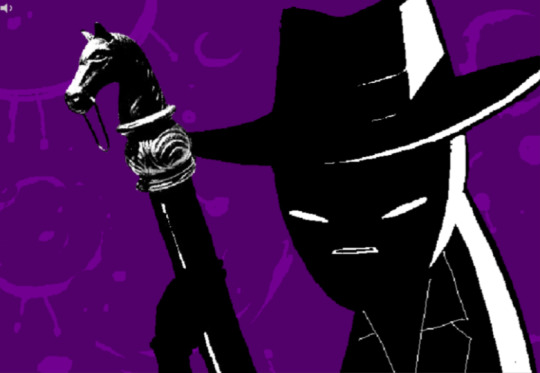

He looks kind of familiar. On page 833, we’re introduced to the full Midnight Crew as the sky switches from blue to bright purple. And comparing these face shapes and designs side by side, these two characters feel like they could have something to do with each other. They’re both really angry, as Spades Slick’s answer to everything is violence, and this new guy refers to the other imps, John and Dad, or both as ‘graveyard stuffers’ (p.891). It’s the only text we get in relation to the character. The narrator apparently has nothing to add and no witty comment on that thought of theirs. There’s then a quick cut where seeing the next page title ‘You are now…’ suggests that we’re about to become this guy, but we instead suddenly become-


Peregrine Mendicant
THE MAIL HAS ARRIVED. Mail, packages and deliveries are a recurring motif – there have been several important colorful packages, several envelopes containing discs, and now there is a letter to Dr. David Brinner, ATTN: SERIOUS BUSINESS. Serious Business is of course the messaging client that Dad uses to keep in touch with his troupe, and we just returned to Dad in the story, so is this finally the moment that wellPressedAttire or officeurchin1280 take their starring role in the narrative? It’s definitely a person in John’s neighborhood but not Dad himself, as we’ve seen the insides of the Egbert mailbox.
PM’s mail based tirade (p.894-896) is of course reminiscent of WV’s mayoral calling (p.686) and PM’s adoption of the hat is just like WV making their sash. So there’s something to say about these chess pieces arriving at these Skaian bunkers and immediately adopting an institution of society as critically important. Both PM and WV’s monologues read as very idealistic, imagining these overly simplistic societies that function like textbook diagrams, as though they know about these things from books similar to WV’s Human Etiquette tome and have never been part of an actual human society. Comparing the two, WV’s monologue feels more peaceful, as it’s focused on everyone getting along, mutual respect, civility and a kind leader. PM talks of soldiers, a crusade, defenders and hope among the ashes; it’s far more violent and adventurous, and feels more grounded in harsh realities even while it maybe overestimates the mail’s capability.
Which is not to criticize the mail or PM’s speech, because I think they’re both great. I agree that mail is very important, highly underappreciated, and I think it’s beautiful to explore an empty wasteland and to think ‘if there are any people left here, I need to make sure they can communicate with each other’.

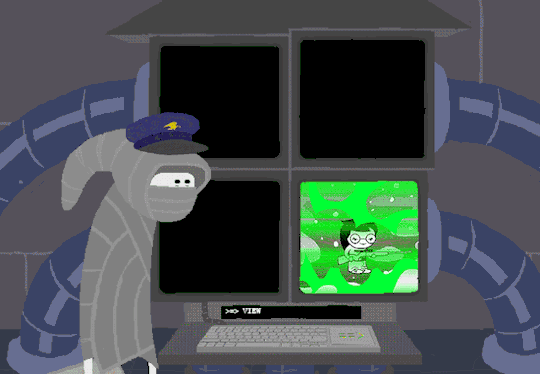
Looking stylish in their new hat, PM loads their terminal and tries to greet Jade the same way WV commanded John. Jade is already covered by a lot of green static, but it appears to be snowing where she is, with flakes and drifts behind her. Which is weird in itself, because Jade is close enough to the equator that a quick search suggests it wouldn’t snow in her area no matter the time of year, especially not with the geothermal power near her house. But it gets weirder, because when John resisted a command he just felt frustrated and got a headache as he tried to ignore a weird voice in his head. When Jade resists a command, she apparently blows up the command station with lightning that she transmits through time and space. Yet another way that Jade is weirder and more powerful than the other characters.
> PM: Sacrifice yourself to save the mail.


#homestuck#reaction#this is my SHIT!! getting to pull page 270 and page 900 and look at those side by side#and have the earlier one now take on more meaning with the context and comparison of the later#it feels good every time also HUGE shout out to the adventure log and search function on the unofficial homestuck collection#working so good every time it is so easy to find the things i need when i need them#truly one of the best computer applications ever made and i mean that with my whole heart#chrono
22 notes
·
View notes
Note
Hi again, going through the different endings of DAV, I was pretty surprised to hear Solas being all like "I am a god!!" when Rook beats him in a fight. I know he has pride issues but that felt so OOC to me?? I was wondering if you had an opinion on it?
Hi, thanks for asking again!
There are 3 tiny (or not so tiny?) moments that I think push the envelope on Solas's characterization in a way that allows us to portray him as more genuinely sinister than the main line established in Trespasser, post-Trespasser media and most of DATV, which is the "Pathetic, stubborn man ridden with massive unprocessed guilt and shame, who can't make a choice without some catastrophic collateral for the life of him, and the unforeseen consequences of his choices repeatedly push him to double-cross people and have them do his dirty work".
One moment that had me thinking is the third memory of the rebellion - I mentioned earlier how Solas's pose and facial expressions make him unduly smug when Felassan calls out that they were supposed to do better than send out an army of spirits, appealing to their nature in seemingly good faith, when they were really a distraction doomed to fail. It shocked me because it seems to strike at one of Solas's core values. It's supposed to hurt more in relation to spirits because we know how much Solas despises wasting, destroying or twisting spirit purpose. And yet, in his confrontation with Felassan, he seemed content, smug even, about achieving victory against Elgar'nan and didn't show a trace of regret.
Another moment is the jab in the Fade that "at least you have Varric to talk to", again with a smug sense of satisfaction. Learning about this line took me by surprise because for all the disingenuity Solas is capable of, I never had him for someone who takes delight in such petty cruelty, especially when the matter is also personal to him to a degree. Varric's death should have hurt him by virtue of their mutual respect gained in DAI, so has the game underdelivered in representing this? Or are we really pushing a narrative that he never really changed his mind on non-elves, or chose not to acknowledge them as people, so Varric was just a disposable fool?
The third specific moment that shows Solas in a worse light is the moment you mentioned in the ask. Though, watching this scene, I feel we need to cite the full sentence:
Rook: [...] I am not alone, but you will be. The Veil needs to be tied to the life force of an elvhen god. And now it is, Dread Wolf. Solas: You sneer at me as though you understand. You are mortal! Compared to you, to your infinitesimal existence, I AM A GOD!"
This is a conditional state of an ending, when you decide to fight him and at least the companions in your party have reached the Hero status, which means they survive Solas's counterattacks, so in the end Rook doesn't stand against him alone, and does not end up in the Fade prison with Solas. This is where Solas is at his most desperate, I think, because when Rook remains alone in the Fight ending, it's a pyrrhic victory. Solas doesn't lash out then, because he isn't done with Rook. The context of "I am a god" is that Rook will soon perish while The Dread Wolf will prevail for centuries still, and no mortals can stop him in a way that matters.
But could it also be a trigger for his greatest fear: that there's a realistic chance he can very nastily die alone with his regrets and self-loathing? Because he does not say he is immortal - he never bound a dragon, so he can't take advantage of the Evanuris perk. Neither does he accept a definition of godhood. It's a matter of scale and comparison; in this final moment, he's looking for a way to belittle Rook and their team.
In fact, the "I am a god" in this context represents the extreme of the views he's held about mortals before - arguably, before joining Inquisition. Though I think that even then, he had trouble humanizing races other than elvhen. If his mind has really swayed throughout DAI, it feels barely half a step towards acknowledging that mortal elves, especially the Dalish, might have a point in their approach to history. Then, in Tevinter Nights, he says to Charter that the elves who survive the un-Veiling might find the "new" world better. Not really a win.
I believe a proper background for this is found in two conversations. First, when Rook keeps poking at Solas's plan to tear down the Veil and he stops eluding the question, Rook says "Spoken like a god". Solas's reply in this moment frankly sounds... too deflective. Like it's coming from someone who genuinely needs someone to constantly whisper "Remember you are but a mortal, Caesar" in his ear.
The second moment is when, after having the loud argument with Elgar'nan to get Rook out of a Fade pocket of despair, Solas admits Elgar'nan is who he feared becoming - callous, tyrannical and contemptuous. I guess Solas's worst moments are supposed to show how close he really could get, because the "I am a god" most definitely defines an ego trip that comes from a place of great insecurity.
If I were a hater looking for a hook to make an uncharitable argument that "He was amoral all along and his gentler side was a mask that just waited to slip", I'd start there.
#solas#solas critical#datv#da the veilguard#dragon age the veilguard#veilguard spoilers#da meta#dragon age meta#character analysis#veilguard bad ending#bad solas ending#ask#featured#tumblr stop moving the read more separator challenge
61 notes
·
View notes
Text
Finished Last Twilight, and I'm not adding to the ableism discourse, because most things have already been said and with a lot of beautiful nuance that I agree with. But I do want to talk about how that ending arrived because of Aof Noppharnach's consistent symbolic commentary on the experience of living with HIV in much of his work, with an approach that's unique among all queer content. Imma skip Gay OK Bangkok since its not even a metaphor there, but I'll explain my rationale for the others, and we can just appreciate the foundation Gay OK Bangkok lays for us to think about the rest of his stuff.
The motif of life-saving medical intervention comes up in all but one of the works he takes screenwriting credit on. He's Coming To Me: P'Med dies originally because of a lack of medical intervention. 1000 Stars: Tian gets a heart transplant. Moonlight Chicken: this one's more subtle, but the whole series is explicitly established in the context of reopening following the COVID pandemic, and Wen will later say to Jim, "we are survivors." It was this line upon rewatch that made me start considering how thorough this theme is. Survivors of what? The meaning is three-fold: hard lessons in love, COVID, and, for gay men of their age, the HIV epidemic. The hope of medical intervention for Day's condition takes on a secondary meaning, with this trend in mind, even if the mixed disability politics between visual impairment and being HIV positive really fails.
His comparisons are more intricate though. Pills and daily regimens are a consistent motif. Day has his daily eye-drops, Tian his pills (which are presumably immune-suppressants to help accept the transplant but I'm not going to Viki right now and watching every ep to find out so someone feel free to correct me). 'But people take medicine for lots of things,' you say. 'Just because its gay doesn't mean its an HIV metaphor!' You have a fair point! But here's where Aof gets real fun and sneaky. P'Med dies from lack of pills the same year Torfun, whose heart will save Tian's life, is born, 1997. I'm mentioned once before 1997 as important for the class-conscious Aof because of the Asian financial crisis that Thailand set off that year. However, 1997 is also important because its the year HAART, or Highly Active Anti-Retroviral Therapy was first used in Thailand (it had hit the market only one year earlier). HAART, a multi-drug regimen, boosted someone's life-expectancy with HIV up by 15 years, and its side-effects were significantly milder than previous approaches. The medical conditions of P'Med and Torfun's heart point us directly to HAART, and what it could offer.
Now we're moving out of the medical and into the experiential connections because, while Dark Blue Kiss is the only work Aof chose to take credit for screen-writing without incorporating medical references, it is by far the most dense with references to the issue of concealment. Its in the narrative as people closet identities and hide relationships, yes, but its in SO much of the visuals, too, most obviously the Pete & Kao mug hidden inside its coozie. It's easy to see the surface story about gay visibility and the closet, but there's a more specific subtext here about the associated condition that intensified the stigma of being gay and how that impacts your sense of self. Bad Buddy explores this issue less, but even in the BL Bubble, its haunted by the stigma of homophobia--it just shuffles it over onto rivalry so the audience can experience it without reproducing it.
However, the grief and shame of surviving when others haven't haunts Aof's other works much more intensely. Jim and Tian both are hung up on guilt for someone's death that they did not actually cause, continuing to pursue the goals for those that passed rather than their own. Then, there's Thun and P'Med, which is the best allegory for living and dating with HIV, bar none. It goes into the feelings of stigma and the limits of physical intimacy with partners that living with HIV caused, especially prior to Truvada's introduction in 2004. Even then, the show depicts how a HIV negative partner maintains the choice to participate in their own regimens, as Thun's desires for physical intimacy with P'Med manage their relationship and never the other way around.
This sense of required separation and gay identities that are less sex-focused also play into oft-maligned motifs in Aof's work. He's talked explicitly about people's criticisms of the limited physical intimacy in his earlier works that led to the more prominent stuff in Bad Buddy, but I hope given the above context, we can appreciate why physical intimacy is less of a priority than other kinds (and I'd add that 1000 Stars, which got the most sh*t about it, is actually one of the most erotically-charged BLs out there because of it's restraint). Then, you have the finales where characters separate for periods of time, and while I don't see this as explicitly tied to HIV experiences (Aof is literally following the book of romcom beats there, even if everyone whines about it), I can't help but appreciate a tangential connection to loving beyond time and distance that was required for those who lived with or lost loved ones to HIV.
I would've loved to see a version of Last Twilight that didn't absolutely bungle its metaphor, because it had every element to be something great (except, I'm sorry to the fans, lead actors with the necessary queer romantic chemistry). Watching the last episode, when the show seemed to finally rediscover plot and pacing, all the other pieces that had been drowned out by the disability conversation peeked their heads out, and I saw what the show wanted to be. The topics related to living with HIV of stigma, survivor's guilt, and assistive technologies: they were all right there, not just for Day but for everyone, if only they had been given the proper time to marinate to develop more complexity. It's the rare instance of a show where I'll choose to spend time imagining what could have been rather than obsessing over what was or just moving on. Even a misstep from Aof, like this, is overflowing with so many more layers than most series. The failures of Last Twilight, in relationship to his other works, even let you see how much food for thought he's providing.
#1000 stars#aof noppharnach#last twilight#he's coming to me meta#hctm#dark blue kiss#bad buddy#moonlight chicken#thank goodness we have heart from mlc where Aof doesn't try to fix him b/c deafness ESPECIALLY is a culture that's not tryna be 'saved'#also for anyone wondering i always say P'Med cuz I can't ever stop thinking of Ohm shouting it on the rooftop
68 notes
·
View notes
Text
Why Is Druid?
Say that like ‘where is Wizard Hut?‘
I love the 4e Druid. This is a marked change from how much I liked the 3e druid, or how often you might see me playing a druid in a Baldur’s Gate game. Back in 3rd edition, the druid, despite being very powerful, never really engaged me, in part perhaps because I was always trying to find something exploitative and powerful rather than merely accepting the juggernaut of a toolkit the game just left in the Player’s Handbook. You couldn’t get clever with the Druid, you just had to pick it up and use it, like some sort of society of creative anachronisms where one of the anachronisms available to the players was has gun. Valid, but hardly sporting.
The Druid in 4th edition is different. Wildly different. Weirdly different, and different in one of those ways that shows what I think of as a seam in the design between 4th and 3rd editions of D&D.
The Druid was one of 3rd edition’s great mistakes, a full spellcasting class with healer capacity to serve as a pinch-hitter healer in a group that wanted things a little more varied, addressing an enormously complex potential build from its earlier edition, 2e, and all in the process, resulting in some deeply confused mash up of abilities that attempted to address confusion with volume. The druid of 2e had a special unique set of rules compared to the Cleric — for example, at a certain level, you passed into a specific category of Druidic ability and now you were technically a Hierophant, and Hierophants had seven extra spells of every level. Of course there was a limited supply of Hierophants in the world, so there was a question of if you could level up if another one existed, and maybe there’s a one-in, one-out policy? First in, first fired?
Anyway, I can’t speak to how it played, but I am at least aware, on the edges of it, that the 2e druid was odd. It had a lot of things it could do, but much of how it worked, reading the books, seemed to be interesting but challenging to manage. You could wild shape, you could heal, you could cast utility spells, you could even fight with some melee weapons — personally, I didn’t see any of it worth it, because none of the things it could do it could do very well.
3e addressed this seeming difficulty by instead taking all those different options and bringing them all up to the same level. Wild Shape worked by checking traits of monster units, which meant that you weren’t limited to specific reinterpretations of animals and instead could do what a druid feels like it should do — you know, turn into an animal. The spells were rebalanced and shared across different classes, which meant that they tended to work in a more standardised way. Armour rules were aggregated, and weapons were made less terrible.
The result was that the 3e druid went from being ‘decent’ at a bunch of things to ‘good’ at everything it wanted to do. The problem of the druid then became about picking the thing you wanted to at every opportunity, and doing a good job of it — you��d have druids carrying wands of healing so they could dedicate their spell slots to more important tasks, like Flame Striking opponents, or messing up the battlefield with roots. You’d also see druids keeping the ‘best’ list of animals on hand, and every new monster book presented a new chance for druids to develop a new best form.
It also created the strange question of What does the druid do?
The answer was ‘everything.’
The 4e Druid, in comparison and contrast to these designs is something very different that touches, at best, on the periphery of what the 3e Druid could be. I mean it stands to reason, you can only ever touch on doing everything when something you’re working from is so powerful. 4e with its role system of Defender, Striker, Leader and Controller, and its reliable, reusable balance math suddenly was confronted with fitting an elephant into a shoebox.
How do you represent something busted that could do everything in the context of a new system that sought to explicitly prevent that? I joked when the game was new that the four roles were Defender, Striker, Leader and Miscellaneous. That any class too powerful, with too much stuff it could potentially do, got thrown to the Controller role as suggested by the first Controller we ever saw being the Wizard. Oh and back in Player’s Handbook 1, the Wizard had a few builds that were pretty ridiculously pushed — the pinball wizard, I’ll talk about it sometime — and that meant that it was easy to feel like the Controller Does Everything.
That impression diluted through experience, of course, and eventually it came to that while yes, the Controller sure has some Miscellaneous vibes, the core of what the Controller was there to do was to attack the enemy action economy. Nice and obvious to a non giga-nerd, right? Okay, how about this: The leader lets you do more things, the controller stops them from doing more things?
And into this space, they poured the druid.
It works beautifully, for my tastes; the druid needs to do lots of things to feel properly druidy, but you need to make sure the doing lots of things doesn’t unbalance the game. Controllers have the widest variety of things they can do and ways they can do them – inflicting status conditions, changing enemy position, preventing specific action types, making areas on the battlefield inaccessible, these are all ‘controllery’ things, and that means there’s a lot of different ways you can flavour them. The Invoker is most famous for making zones in the play space hard to deal with, the Wizard has a build that slides things all over the place, and the psion controls people with immense penalties to their damage rolls.
Obligatory pause where, while reading this aloud, for either Fox or I to comment on how amazing it is that Dishearten is an AOE power.
Anyway, the druid was designed to be a mode switcher class. That is, there are two ways a druid can do things. One is a melee controller that makes a single target’s life harder, the other is a ranged controller that makes a large group of enemies’ lives harder. This mode switching then adds a new element to the class that your powers can interact with, where you now have control powers that can add a mode switching element to them as well. This is your Wild Shape – you transform into some kind of nonspecific beast, which can use your Wild Shape powers. Each form has fewer powers to manage, and you can build your druid to specialise in one or the other or do a mix.
This lets the druid do the ‘a lot’ without letting them actually do everything. You have a lot of choices and a lot of ways to play with those pieces, but even just how often you use the mode switch is part of what the druid does to control the battlefield. When I first played a druid, it was not uncommon to start a fight out of wild shape, use the first turn to make some kind of area control power, then shift into wild shape for the rest of the fight kicking people into that area control power. There are druids builds that work like wizards and only ever shapeshift to get away from problems, and make a hit while scuttling away, or to sit on a specific type of problem. There were druids who focused on summoning monsters and using them as kind of turrets on the battlefield, positioning allies in a way that benefitted them around those summons.
Lone artillery combat encounters, where you have a bunch of stuff in front of a long-ranged attacker? Druids love those. Even at level 1, that artillery is spending their days completely stuck underneath a Fire Hawk power.
Problem is, of course, that if you want to do Everything doing a Lot is going to miss something. That was what led to the subclasses of the druid, the ones that added healer elements to the druid, because the druid back in 3e could do that. It added animal companions, because the druid back in 3e could do that. Now I don’t worry too much about these things because if I wanted an animal companion on my Druid, I’d take a theme for that, but also because these changes were introduced in an Essentials book.
Which is to say, they’re crap.
They’re not crap crap, like I try to defend Essentials as giving players a choice for simplified character builds, but in the specific case of the Essentials Druids, in order to work with the simplified choices, these Essentials druids with their animal companions and their healing powers have to look at all other Druid powers and not use them. The only use they get out of their animal companion is using the specific subset of powers that make them work, and that makes combat more samey. But again: That’s a thing you probably want if you want a simplified build.
Still, it gives rise to my favourite joke – I mean like, funny thing, not really a joke, there’s no subversion of reality or anything here – about the Healer Druid. See, every Leader in the game gets an encounter power, usable twice a combat at level 1, that heals an ally with a bonus. Every class gets their own version that lets them distinguish their class specifically and add some interesting detail that shows how this Leader differs from other Leaders.
The Healer druid build gets Healing Word.
The Cleric power.
Literally, the same power, same name, listed as a Cleric power.
Check it out on PRESS.exe to see it with images and links!
97 notes
·
View notes
Text
Some disparate thoughts after yingdu ep 1 (not rewatched or read anyone else's thoughts yet but had seen the pre-release pvs etc)
some time travel mechanics questions answered and some more raised. It's now confirmed what happens if you stay beyond the 12 hours (you're stuck forever). This had been speculated before but this is definitely the first confirmation. Now, in terms of questions? Was lu guang just using his powers normally during the scene at the con and didn't want the others to see? If so, is what we saw as the audience what *he* sees? That would imply he gets rather more context than we'd previously thought. Could just be letting the audience know the backstory though and has no impact on how his powers work. Net zero info ig.
speaking of that backstory, you can tell this arc has brought in more fans behind the scenes. The animator backstory was pretty on the nose and some of the early aspects were very... well, a specific flavour of fanservice, shall we say
also, wow, everyone was thinking lg's fashion sense was awful when we got the first previews but it was cxs to blame all along
so, romance scammer parallels, huh? Taking this on two levels. one) the shiguang level of "don't dig yourself deeper" when lg is... busy digging himself deeper (plus the whole thing about "if you'd just been honest from the start") two) the aspects of "taking advantage of someone when they're at rock bottom" mean I'm now lowkey expecting a similar dynamic to appear once we reach yingdu (perhaps xia fei in the role of the 'victim' as his relative is missing? pure speculation but hey)
confirmed lg can supposedly see into the future with his power. Not taking this at 100% face value considering how dodgy lu guang is around their powers and the fact he's keeping track of timings so thoroughly but at least at this point, he's claiming it's the case, so.
makes me wonder if his notes on timings are from previous loops or if he's just spamming photos when he's worried about something and noting down the timings (hospital-boat arc???)
so many xia fei cameos. I wasn't counting but there were at least three and curiously he appears plenty *before* anyone is even in yingdu (and we know he's got plenty of billboards over there). He's got some global reach for someone who appears zero times in s1 and s2 (which could just be down to them not having written him yet but does make his absence previously more obvious by comparison)
somehow there's *more* prominence on clocks/watches than even normal link click (makes sense as lu guang himself has such a focus on them and we're way more in his pov now). Interestingly though, I don't *think* we saw the time at the beginning when cxs was in the dark room
oh also! when lu guang expects cheng xiaoshi to ask how he "divined" the answer and cxs essentially says he'll wait for lg to tell him + him mentioning he'd sensed lg was hiding something from the very start. sth sth works on a broader scale than just the initial power reveal
also gdi no homura fan lu guang reveal. he gets his time travel stories from other anime, smh
belated realisation edit: lu guang clapped his hands when he checked the photo at the con. This *could* indicate cxs-style diving but I somewhat doubt this both because lg is implied to now be stuck in this time and also because time passes parallel between the inside and outside of a photo so he couldn't speedrun a full dive in the few seconds he took? in which case, is he just clapping because he himself doesn't realise yet he can activate his own powers without clapping? would fit with this reading as an earlier lg. hard to decide what happened there for sure without more info though tbh
20 notes
·
View notes
Text
Of the many, many plates of pancakes* that were offered to the listener in magp 1-07, this one may be my favourite

[ID: A screenshot of an unofficial transcript to The Magnus Protocol. CELIA is saying "Yeah. I mean, it's an old system, but it could have been worse. It's not like we're wrestling with tape recorders and manila folders." /end ID]
When we meet TMA-Celia for the second time, she's lost her name. She was Lynne Hammond, and now she's not. She doesn't seem to remember Martin, either, but it's not clear how much of herself and her life from before the change she does remember. She's freaked out by the tape recorders that start showing up, and there's no indication that she associates them with the Institute specifically.
If Celia Ripley is, as we are clearly intended to believe or consider, the same Celia as in TMA, why is she making knowing comments about manila folders and tape recorders? Tape recorders in particular are hardly standard equipment at what seems to be mostly a text data-entry and cataloguing job. She could have said typewriters, or carbon paper. Fax machines, if we're dunking on Freddy specifically.
She says "tape recorders and manila folders." Celia Ripley is referencing The Magnus Institute, particularly the outdated technologies in use in the Archives.
Maybe she learned more from Melanie about what the recorders were and did at the Institute, sometime after MAG 190. Maybe she has those specific memories of giving her statement in MAG 100, and little else. Maybe Martin grew an apocalypse beard and she remembers everything, but just didn't recognise him out of context and in a tunnel and during A Pretty Weird Time Overall.
Maybe she stuck around with Melanie-Georgie-Basira for a while after things returned, and that's how she learned about the particular significance of tape recorders.
Maybe she found some tapes and listened to a couple hundred of them.
Or maybe she's simply an AU Celia, with a knack for oddly specific and kind of clunky comparisons, drawn into this through the powers of metafiction and string theory.
Or maybe someone filled her with spiders and sent her to finish the job of spreading Fear to this particular world.
And the reason this particular plate of textual pancakes** (short stack, butter and nightmare syrup) is one of my favourites from "Give and Take" is because I genuinely have no idea! None of these are theories because there isn't enough evidence to point me in any particular direction. It's a mystery!, Jon voice, etcetera.
If you cornered me and paid me to have an opinion about it I could say which options I thought were more likely, I guess. But the odds are high that I'd be wrong, and I think the boat for me getting paid to interpret texts probably sailed fifteen years ago, besides. I'm in this for the love of the game.***
November is the true spooky season in the northern hemisphere.**** Yeah, October ends with Halloween, but you know what month starts with Halloween? Mmhmm. By November of 2019 TMA had been on my list for a few years, and someone I was getting to know and really liked recommended it to me specifically in the days after 159 aired. The conditions were correct for me to get into something new, is what I'm saying. I still remember listening to "Anglerfish" for the first time, walking home from my office job in the blustery November dark. I got home starry-eyed and red-cheeked and thrilled by the story I'd just heard.
It took a couple of months for me to catch up, and though I loved having so much to listen to there were times when I wished I'd started earlier, to have the experience of seeing things unfold.
And now we're back at a beginning, and get to experience the horrible joys of finding out.

[ID: A screenshot of an unofficial transcript to The Magnus Protocol. LENA is saying "Of a sort. I hope you're as ready for it as you think you are. Consider yourself "in." /end ID]
*Sabrina pancake meme
** the best kind, especially if it's a contest between textual and fluffy pancakes. Keep those spongy bastards away from me, I'll take the kind with a typeface instead
***Being a huge nerd
**** For more of my opinions on November, see https://www.tumblr.com/almostmolly/188799234276
#tmagp#tma#the magnus protocol#celia ripley#celia tmagp#lynne hammond#tmagp meta#loosely. this is neither litcrit not analysis nor speculation in the sense that i don't subscribe to any of the possible paths as true#and also realise there could be a dozen other things i haven't talked about here#i know I've said spiders celia twice but I'm kind of like a person who makes red string boards for the aesthetics#it's part of the decor y'know?#sorry for the link to my tumblr poetry blog but also: I'm not bad at it so. not that sorry#pancakes (derogatory)
125 notes
·
View notes
Text
Teddy and Indie thoughts (somewhat extensive considering they had like 5 scenes).
I love Teddy and Indie so much so far. Indie works best with Teddy IMO because they kind of lean too hard on her being a Young Person when she's with the others who are reasonably older than her, but that's not really an option with Teddy. I also think their dynamic is very distinct as one of Teddy's friendships, there is a very specific energy that feels different to how he was with some of his earlier friendships and I think that's a good thing. Teddy has historically not known how to be friends without some level of romantic tension or just straight up dating and I would really, really hate that for Teddy and Indie (I will keep saying siblings dynamic until it sticks) so I think it's a good sign that things feel so different with them right now. Also, I love Teddy being a little bit bitchy - I definitely have faves where the popular fandom interpretation of them is worse than "he's nice" but I also think it's good for him to be a bit bitchy sometimes to counteract that. And a lot of it is silly and funny and I've missed Teddy getting to be those things as well as tragic.
(A brief interlude to live up to my title of Theodore Gowan's Most Annoying Defender: Teddy is not being too mean to Indie! I've seen some takes that seem to think he should be nothing but lovely and soft spoken and like a primary school teacher and... that would be really weird because they are both adults. She is a nearly fully-qualified paramedic, it isn't that unfair of him to expect her to have most of the skills of a fully-qualified paramedic. Also, conflict is what makes things interesting? Teddy getting annoyed at Indie for not knowing stuff and then Indie getting annoyed at him for being annoyed is such low stakes conflict as well, but it's silly and I appreciate the moments where he checks in on her and they look out for each other even more when they happen in the context of that low stakes conflict. This concludes Mercury getting defensive about Teddy.)
Favourite parts of the episode: "I didn't think you'd get stage fright." "Happens to the best of us." "The best of us? 👀 Yeah, alright..." and "I never passed the cardiac care module." "I could've worked that one out!" and "Let me deal with this and-" "No, I can handle him."
HOWEVER. I MUST NOW COMPLAIN. I wish that scene where Teddy decides to lie to Jan for Indie wasn't about Iain. Not just because, let's be for real, Iain would snitch to Jan IMMEDIATELY. Also because that’s a pretty important moment for both of them and it deserved to be about them and not FUCKING IAIN. For Indie, I think new characters usually have to have a moment where they form a proper connection with an existing main character to drag them properly into the rest of the show and that’s what this moment is - she’s trusting Teddy to not tell Jan and Teddy is trusting her to pass her resit, she is dragged into the drama of being a Casualty character with connections to other Casualty characters. But they were too busy telling us how great Iain, the paramedic she has interacted with the least, is. For Teddy, I think hiding that from Jan is a pretty interesting development for him. It shows that even if his professional and personal growth is slower than Sah’s (for example, because it’s an easy comparison to make), because the professional and personal are so tied up for him and because his aunt is there all the time, he is still growing. I don’t think S37 Teddy would’ve had it in him to hide something like that from Jan, so it shows that his growing professional confidence and his inherent kindness is beginning to override his loyalty to Jan WHICH IS MASSIVE. So much of Teddy’s character has been about idolising Jan and I’m glad to see that might be changing. But it also wasn’t actually about that because it was just Teddy talking about how cool and nice Iain supposedly is.
Only one thing I did like here: Teddy asking “You okay?” after Indie couldn’t place the defibrillator pads kind of paralleled (if you overthink it) by Indie asking “You alright?” about the Iain stuff.
Otherwise, that scene has been replaced in my head by a better, less Iain-centric, one.
8 notes
·
View notes
Text
Aegon and Gold
Side note : this is a very mixed up “analysis” that sort of combines both show elements as well as some popular fan theories/assumptions since we barely had time with the character (may I remind you all, to possible infuriation, that we never saw Sunfyre up close). So yeah <3
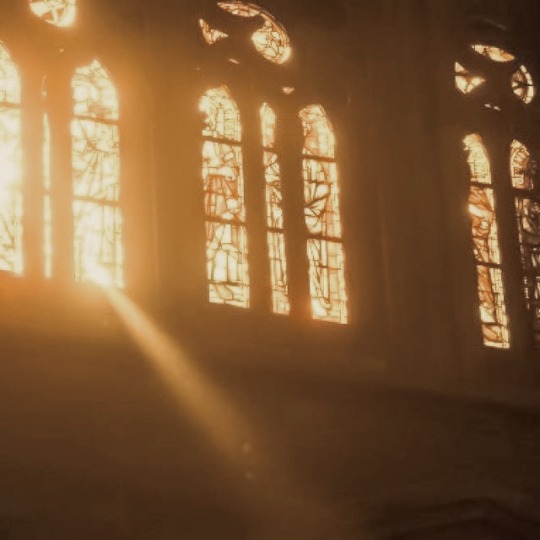


So I do think it is said quite a lot that Aegon would wear gold to honour Sunfyre and what not and I do believe he would happily do that, it’s just he can’t.
Okay so first let’s just get straight what gold can mean for him.
Yes of course, it’s the colour of his most beloved dragon. They aren’t strongest dragon - rider bond in all of Targaryen history for nothing. Sunfyre was able to kill dragons much larger than him, defended Aegon in crisis and would not go down without a fight even when he was on the brink of death. Looking at the larger picture I think Sunfyre represents a sort of freedom for Aegon. To fly anywhere he’d like, on his own terms, never to be found and be freed from these shackles of duty that he (initially) does not want. Sunfyre also symbolises him finally having bonded with someone. His father acted as though he didn’t exist ; his mother was too young and pressurised to shape him into a worthy heir (and taking whatever means it takes to do so). His dragon is his very first true bond, him claiming the dragon alone is proof enough that he is a worthy Targaryen (in his head)
Other than Sunfyre however, gold is also the colour of the first dress we see (a grown up) Helaena in. His lady wife and younger sister. Now going off the show alone, sadly we do not have any scenes of them together but in context and background clues alone (Helaena laughing at his taunts at Jace, Aegon getting jealous when she accepts Jace’s offer, Helaena looking at him with pity/worry when he is crowned - knowing what this means for both of them and so on) I do not think that their marriage is a utter disaster (as some fans suggest). Gold is the first impression of his wife, the mother of their three children. Who do you think he had the courage to vent his heart to when he got too drunk in their shared rooms? Who do you think he constantly sends gifts to, as an apology for not being around? Who do you think Alicent brings up first when the Dyana situation happens? (“think of the shame on your wife..on me”). I do believe that Helaena is some source of happiness for him. It may have taken years to develop a strong bond ,as he did with his dragon, with her but they are there. After three kids and six kingdoms to manage, I think it is fair to assume that they get along fairly well.
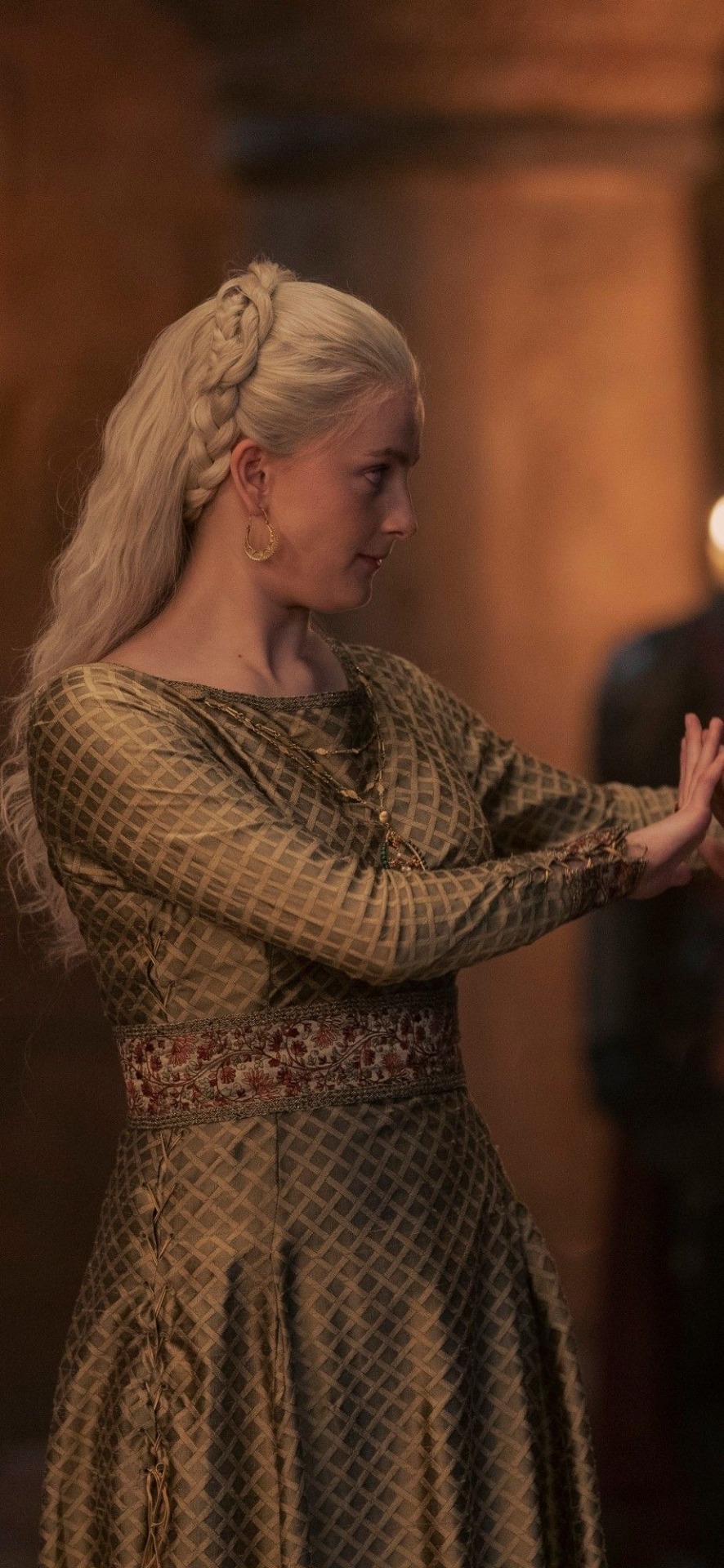

Now obviously there is a lot more to Helaena and Aegon’s marriage than “getting along fairly well” but for the convenience of the post and the topic at hand, I have had to make it somewhat more concise.
So Gold is definitely a positive colour for him. But one thing that is not gold is the very symbol of his title, claim and rule. His crown.
The crown of the conqueror is black with the red ruby in the middle. I’ve also heard some people call it a dark silver (which would be the direct contrast to gold). So while gold represents his freedom and happiness, silver (the direct contrast) or black (the title colour representing the opposing faction) represent the cage of duty he has to put himself in for his and his family’s safety. During the coronation itself, he does not wear dark green (as he did earlier) or gold (even though he may prefer it) but rather black to represent this in a way.
In comparison, the crown worn by Rhaenyra (the key figure of team black) is gold. And I think arguably Rhaenyra (even as a Royal woman in Westerosi society) has more freedom than Aegon.
Also the gold crown of The Old King was also worn by Viserys. I do not think that in Aegon’s perspective, his father was a source of happiness in any way. But what could have been, was his crown. Gold and the symbol of King Jaehaerys I, someone who had a long, relatively peaceful reign over Westeros. Since the idea that he was to inherit the throne was put in his head so early, he must have thought about it quite a bit. He did not want it of course but if it had to be done then perhaps, he would have desired a reign like the Old King’s. (Not to mention, he and Helaena named their first borns after Jaehaerys.)
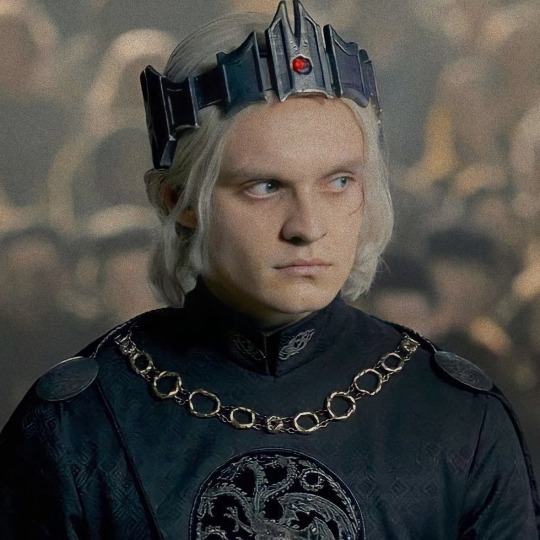
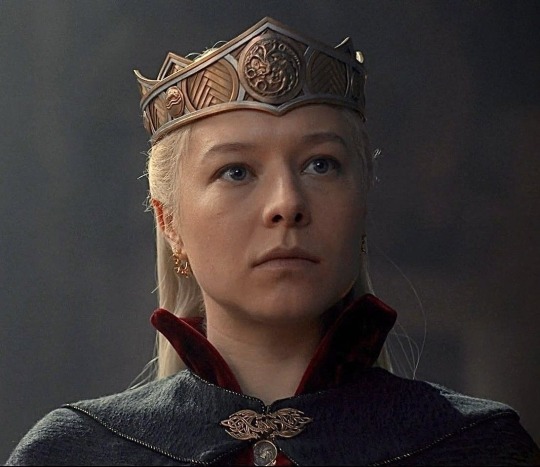
A few comparisons to my Alicent “analysis” :
So similar to Alicent leaving her childhood memories with Rhaenyra behind when she became queen (abandoning the colour blue), Aegon also leaves his freedom behind when he becomes king (not wearing gold or green but black)
Both her eldest children and now king and queen (Aegon and Helaena) are following her patterns and reaching their breaking points and have had a shift in their wardrobe to symbolise as such.
#aegon ii targaryen#house of the dragon#analysis#colour analysis#helaena x aegon ii#team green#helaegon#alicent hightower#sunfyre
72 notes
·
View notes
Text
Conversion Corner: Starbound Aliens part 1
Florans
And now it’s time this week to do something I’ve meant to do for a while, but wasn’t sure how to implement: Conversions of the various playable species from Starbound!
I still remember when Starbound was first coming out as a sci-fi take on the 2D sidescrolling block-based survival game, similar to Terraria, and it has certainly evolved from there, with plenty of alien species to play as.
However, the trick comes from the fact that the alien species in Starbound only provide cosmetic effects, determining what your character and their items look like, as well as how they describe objects in the world. Not exactly a lot to work with for traits based on biology and not culture, but there is plenty of lore which helps us fill in the blanks, so that’s what we’ll be using to flesh them out.
And with that, I present the Florans.
As the name suggests, florans are a species of plant people, but I would suggest disavowing yourself of any notions of peaceful nature lovers, for the florans are predatory carnivores much earlier in their civilization’s development, tending to wear simple clothing made from local materials and wield simple weapons as a baseline. What’s more, they have trouble recognizing that other sapient species as anything other than particularly talkative meat, making them dangerous to deal with.
All of this would seem to paint them as a malicious, dangerous species that has not business being part of the galactic community, if not for the Greenfingers.
Greenfingers are a rare variant of floran that are calmer and more cerebral than their kin, more curious and eager to learn. What’s more, they also have an innate ability to manipulate plant matter, not just reshaping it, but actually coaxing plant matter to form symbiotic relationships with the technology of other species, filling in missing gaps and making it more intuitive for other florans to use.
As such, Greenfingers are the de facto leaders of floran-kind, and typically actively work to educate and enlighten their kin to better interact with other species in a peaceful context and improve their own technological innovation. The fact that there is only ever one Greenfingers in a tribe at a time might suggest perhaps some sort of hormonal trigger during development, perhaps a genetic manipulation by the Ancients to give the florans a way to uplift themselves? That’s my theory.
In any case, the very existence of the Greenfingers and individuals like the heroic hunter Nuru implies that this tribalism and speciesism is a product of their current culture, rather than anything inherent to them, and the Florans we see now in-game are likely on that transitionary period just before enlightenment where they will one day truly join their peers on the galactic stage.
Florans are humanoid in appearance, though made of green photosynthetic plant flesh, with wide, cheekless mouths like a snake and flower-like structures on their heads. Though they are a single-sex species, they do seem to possess a sense of gender identity, their bodies subtly altering to reflect that over time.
The typical floran is brash, impulsive, and quick to act, having little patience to think things through. On the other hand, they derive simple, childlike joy from their interests and methods of expression. Their Greenfinger kin are more patient by comparison, and demonstrate surprising compassion even as they use their wits to outmaneuver those bold enough to try and supplant them. In a way, the Greenfingers are almost like their tribes “parent”, trying to teach and nurture the best aspects of their people even as they fight against centuries of traditionalism.
With that in mind, floran society is basically nonexistent on a macro scale, with each individual tribe essentially governing themselves with their Greenfinger’s guidance. This does, however, mean that there is a lot of variety in how florans interact with other species. More isolated tribes may attack on sight, while those with a lot of contact with other species may have come to realize that the funny talking prey is actually fully sapient and worthy of their respect.
Floran
Ability Modifiers: +2 Str, +2 Dex, -2 Wis
HP: 4
Size and Type: Medium plants
Floran Tech Familiarity: Florans have an intuitive understanding of technology that incorporates biotech elements. They gain a +2 to Computers, Engineering, and Life Science rolls when used to interact with biotech. This includes biotech computers, biomechanical ships and other technology, technology augmented and repaired by a Greenfinger, and other options as GM discretion.
Limited Plant Benefits: Despite being plant creatures, florans don’t gain the standard immunities associated with creatures of the plant type. Instead, they gain a +2 racial bonus on saving throws against mind-affecting effects, paralysis, poison, polymorph, sleep, and stunning effects, unless the effect specifies that it is effective against plants.
Photosynthesis: Florans are capable of photosynthesis, though it is somewhat limited and doesn’t provide the nutrients they gain from their carnivorous lifestyle. They can survive three days on sunlight or UV light before having to roll Constitution checks for starvation.
Scavenger: Florans gain a +2 to Perception and Survival
Weapon Familiarity: Florans are always proficient with weapons with the analog special quality. Additionally, they can utilize the thought special quality of a weapon if it also has the living quality as if they had telepathy.
That will do for today, but I hope you’re excited for more of these conversion, and I hope to see you at GenCon!
14 notes
·
View notes
Note
Hi. I apologize for the delayed response. I've been busy with Lunar New Year celebrations, and unfortunately, I haven't had the chance to check Tumblr until now. Here are the links that I sent in the foreshadowing ask https://www.tumblr.com/maoam/740334141571219456/chapter-182-beginning-of-sasuke-retrieval?source=share and https://maoam.tumblr.com/post/689252113529847808/narutos-feelings-in-kage-arc. I also apologize that I should have considered the possibility of you being wary about clicking on unknown links, especially given the current complex state of network security. I simply wanted to ensure my ask appeared tidy.
Hello there, I know you sent me an ask a long time ago about my opinion on these posts, I don't know Japanese so I can't say for sure if what she translated is correct.
What I can tell you, is that suicide amongst Japanese warriors was a practice that was considered the epitome of self-sacrifice towards an ideal. It was also an undying proof of loyalty, the ethos of Bushidō:
Ideas of the samurai code formalized earlier samurai moral values and ethics, most commonly stressing a combination of sincerity, frugality, loyalty, martial arts mastery, honor until death, "bravery", and "loyalty to the samurai's lord." The idea of a samurai code or codes was developed and refined centuries before the Edo period in the Kamakura period. (Source) Seppuku (切腹, lit. 'cutting [the] belly'), also called harakiri (腹切り, lit. 'abdomen/belly cutting', a native Japanese kun reading), is a form of Japanese ritualistic suicide by disembowelment. It was originally reserved for samurai in their code of honour, but was also practised by other Japanese people during the Shōwa era (Source)
I don't understand the comparison, regardless. Why do they claim a character (Darui) speaking of double suicide directly relates to Naruto speaking of dying alongside Sasuke (they used Japanese raws in one image, not in the other one, so I'm not sure the possible interpretation of the Japanese writing, did Naruto use the same "心中" that Darui used?).
The first example they present is from a specific character and his arc (Shikamaru), is he who introduces the notion (women being a problem), and is he who closes it, modifying his views (for a specific woman, Temari).
In the second case, it's Darui who introduces the notion (in a single bubble speech, not an entire page like Shikamaru to convey the relevance of his views), so how come is Naruto the one who closes it?
There's no mention of suicide, either, Naruto claims they'll die together, but the context implies a clash, a fight between them both, not a double suicide; furthermore, Naruto's statement is "If we really do take this all the way to the end, and we both die..." He's not choosing to die, and he's not looking forward to it either, he's listing it as a possibility, that if it happened, it'll mean that in the next life, they'd have no burden of being an Uchiha or a jinchüriki, being able to understand one another without that weight upon them. Having a "clean slate" to understand one another, of sorts...
Kishimoto used the name Monzaemon Chikamatsu as the creator of puppetry ninjutsu, and he is one of the most well-respected Japanese authors. Indeed, Chikamatsu was better known for his double-suicide stories (alongside his reflection of commoners within his plays), but Kishimoto likely used this name because Chikamatsu was, well, a japanese playwright of the jōruri, puppet theatrical art, ancestor of bunraku and kabuki; so likely his homage has more to do with Chikamatsu being "the father" of puppet plays, and less to do with the idea of "double suicide" (Chikamatsu is also mentioned in a completely different arc by Sasori when fighting Chiyo, there's no mention about his stories but rather, his relevance as a puppeteer).
About the second post... I don't know what to say, Hinata confesses as she ends her speech with "I love you, Naruto-kun", while Naruto finishes it with "I'm happy I knew you", the speeches are similar as they both focus on the influence of the other person in their lives and how they inspired them to move forward in their goal; they both idealized the other (Hinata -> Naruto / Naruto -> Sasuke) so in that front, I understand the parallelism.
Naruto uses this speech to morally downgrade Sasuke ("one bad move... and I could have been like you..."). Hinata's confession focuses on how she wants to be beside Naruto, moving alongside him, Naruto's speech is mostly about how he wants to "surpass" Sasuke (their fallout starts when Sasuke refuses to acknowledge Naruto).
I don't understand the "notice how Hinata is facing away from Naruto while confessing, while Naruto is facing Sasuke. It’s the same thing whenever Sakura is confessing, Sasuke always gives her his back. This is again intentional from Kishi." The reasoning is different: Sasuke turns his back towards Sakura because he doesn't want to face her (there's rejection, yes), and Hinata has her back turned because she's facing Pain. Naruto is paying attention to her. Meanwhile, Sasuke and Naruto are facing one another because they're the ones about to fight, so the context in each situation is completely different.
9 notes
·
View notes
Note
hello, I love what you're doing with your AU. as someone who is making an AU myself, do you take somethings from "canon" and put them in? if so how do you decide how to put things into the story of Vigilante
GAHHH IM LOVING THESE QUESTIONS!! Fangirling aside, it really depends what direction and plot you’re taking with your AU. Time period, location, and main plot all are big factors here, along with how polished you plan the story to be.
Let me do some comparisons with my two AUs
Vigilante: I did want to keep main aspects of the game in there, but sometimes plot can get in the way of that so you really have to get creative. I won’t spoil anything but I did have to do this with a few main plot points in the game. Tom being Boris in this AU is one example: two Boris’s that look exactly alike would be very difficult to explain in the context of this AU, the only way I could see this working is having them be twins which is it’s own can of worms. There are a few other examples but again no spoilers. This is specifically a BATIM AU due to the difficulties BATDR provides for the AU, plus this AU was also made way before BATDR was released and I already had my main plot points done. I was lucky with the time period because early BATIM did happen in the 1920’s, tbh this is one of those moments where I bullshit the story and say “well in this world-“ mostly referencing the animation era and just moving it to take place in an earlier time. I don’t like to do this too much because I do try to be as accurate as possible, but in the end of the day it’s my story and I can do whatever I want😜. I also got luck with the setting too, correct me if I’m wrong but the cannon studio is in either New York or Brooklyn but at the time I actually didn’t know that so… Lucky me lol. I decided to make Henry’s backstory actually relating to the main plot of the game, he goes back to the studio except this time he’s trying to find Bendy. If you didn’t know, Henry also leaves the studio in this AU. I won’t spoil any more of this because I want to expand on the little man more in the future but that’s what I got.
The Void AU:
This AU was made 6 years ago, it is quite old- This AU was probably my first intro into story making so it’s very messy. What I mean by that? The plot is everywhere, many characters are flat or have no real goals or morals, Bendy was honestly the worst guy ever he was such an asshole (not in the cute way) and was the most toxic mf alive, the amount of Warriors references that are there is honestly exhausting and basically turns this whole “original story/AU” into more of an elaborate Warrior Cats fanfic, the many villains that popped up were super flat and boring along with every protag too, and finally this take place in a forest/plain/camp place and tbh I don’t even know what the setting is.
With that being said…
What I was talking about there was the “original” version of the AU, call it “Random Mess 1.0” if you will, since then I’ve changed many things about it since it’s original creation. Keep in mind, the Void AU you see is only one of the arcs in this full AU and it’s basically the last one, so many of you don’t know a lot of the whole world that’s in the back of my brain. I will tell you the changes I’ve made for the characters and story you do know: I made Bendy much more likable protagonist with goals that are much more expressed, I polished the plot a lot more than it was before, I made a few things more original and deleted a lot of the Warriors references (so many…), I gave many of the characters more expressive personalities which the reader would be able to recognize, I fixed the designs to match the fluffs personalities much more and to help make them more expressive. NOW BACK ON TRACK, I honestly didn’t have any of the cannon events in the game really happen in this AU, the only thing really relating to the actual games is the alt. designs (demon/spirit forms probably the only OG thing I created that was pretty cool, this concept is also featured in the Vigilante AU) I’ll show them here at some point but that aside, this was just a goofy, silly, story that I made just for fun so I really didn’t care how the story went. The Void AU you all see is probably the most polished part of the story and because of that it’s able to be cut off and stand alone as it’s own thing.
Ok, I probably went off track many times and started rambling so my bad, BUT this is sorta how I see it: Depending on the plot you can add and cut out things as you please, this also applies to the quality of the story you want to tell.
#Please ask me more questions like this I love them sm#batim#batim au#vigilante batim au#ask#k’s rants#vigilante concept#the void au
18 notes
·
View notes
Text
Alright, so. Waves, by The Dear Hunter, is one of my favorite songs of all time, which obviously means I'm obligated to talk about it as often as possible, so here's another song crossover post for Sleep Token. I really did try to keep it brief, but brief is very relative when it comes to these posts apparently, especially since it's still about ST at the end of the day. I'm not going to get into the lore behind this song too much, as it's part of the 4th album in a series of concept albums with a very clear-cut story progression.
This post will make significantly more sense if you've heard the song, as I'm only pulling out chunks of it here, so it isn't required but I highly recommend giving it a listen first!
To preface, there's been three Sleep Token lyrics that have been stuck in my head lately: "you don't really love, you just hate to be alone", "we'd rather be six feet under than be lonely", and "I might break and bend to my basic need to be loved and close to somebody". Those form the basis of a candidate for a thesis statement of the story of ST's discography and especially this trilogy overall, and I'll touch on that very briefly here, in tandem with this first portion of lyrics.
You knew the way things were You knew the way they would be We knew exactly how it'd end
It's that idea of the doomed lovers going all in, despite the knowledge that the end can never be in their favor, because neither wants to be alone, would do anything to avoid it, even if that love is false, tainted, toxic, inconsistent, obsessive, or destructive.
Then, the chorus:
Now I'm preparing for a burial at sea But I can see the lighthouse Yeah I'm praying that these waters don't take me 'Cause I can see the lighthouse
Okay, I lied earlier, a bit of context is needed here about this song to make my point... by the time Waves appears in this story, our protagonist has realized that the aforementioned philosophy is reaching its logical conclusion and no longer wants to be trapped on this metaphorical sinking ship, can see the promise of possible safety but he doesn't know how he could possibly get there, so he's resigned himself to a "burial at sea". Despite the inner turmoil, he's still tying himself to this fate that he sees as inevitable. Later, we even have a flipped version of the first quoted lines, where he blames solely himself for what's happened, particular for the harm he's caused.
Vessel oscillates much more drastically between this and other ideologies than the protagonist of the Acts does, and with the imagery of TPWBYT there is a great deal more sinking going on, but as you'll see in a moment, this is still seen in Waves to a degree. Furthermore, the philosophy of "This Place Will Become Your Tomb" as a statement, assurance, and threat is the same here as it is there. (If you're familiar with the Acts, it fits well with the Oracle's speech at the beginning of Act 5, does it not?)
And, spoiler alert for Acts 4 and 5: he does, in fact, end up coming back to the person he's singing about here.
I'll start wrapping up this already overly-long post with these four lines, which are probably my favorite of the entire song.
I was screaming that the ship was sinking But you were telling me to just keep drinking Quartered into parts again Arms and legs at the bottom of the ocean
The imagery of everything falling apart around you (a relationship or your general life) and the other party not engaging seriously, enabling and encouraging self-destructive behavior instead, is potent. Typically when I see discussion of addiction or alcohol abuse specifically in ST's discography, it's in the context of Vessel's partner, but any kind of distraction or self-destructive alternative being pushed towards him would be in line with readings I've seen, if we were to look broadly and not literally. Though, with the way I do personally read into some songs, I'd argue that a literal comparison of that wouldn't be out of the question.
Then you have the final two lines there, which prompt obvious visual comparisons to Missing Limbs, but honestly I'm just including them because I adore them. There's certainly lines from Missing Limbs that would fit with the Acts, though, particularly in tandem with Where the Road Parts in Act 2, and the combination of helplessness and anguish in those two lyrics can match pretty cleanly with the overall emotional tone of Missing Limbs, depending on your reading of it.
Either way, whether it's for the protagonist of the Acts or for Vessel, there is a very common idea that gets brought up time and time again, summarized very cleanly with the opening and ending lines of the song.
I thought that I knew love but it was just a wave crashing over us
This, however, challenges and is challenged by what love even means to them, at any given moment in time. Was the protagonist of the Acts in love, or loved in return? Did Sleep/Vessel's partner ever truly love him either? How does the definition of love change over time, at which parts of ST's trilogy would one consider either of them to be in love with the other? What does it look like? Is it just that crashing wave, the passionate violent laceration, an entanglement of the impulse to love and the instinct to kill so you can finally express it? Is any of it love? I thought I knew your love, but I'm not so sure anymore. Can you show me? Do you wish that you could?
#lmfao @ me thinking this could ever be short.#also the point of this post ran away from me entirely sorry. hands took over and started typing on their own#sleep token#to be clear: any song crossover posts i make aren't arguing intentionality. it's a springboard to talk more about the lore/ideas/etc#aqua's offerings
5 notes
·
View notes
Text
Friends...it is with a heavy heart that I must announce...I think maybe sometimes the Pokemon anime is good. I'm crying also.
Maybe watching the various seasons for so long has lowered my tolerance threshold, but we've been watching the Hoenn series and got through the first two seasons of it, and it's...good. Like actually pretty good. I did like Alola a lot, I'll grant you that one, but I think that's more comparative and enjoying the general group going on. Hoenn feels, like, legitimately good.
To keep up my usual cred, I am attributing this largely to May, who, in an effort to be as incendiary as possible, I am going to refer to as "Serena but good." While I enjoy the Alola collective better as a group, May is the best companion Ash has and it is not close. She's goofy, she's snappy without being mean, she's just a fantastic personality to follow, and her dynamic with Ash feels the strongest. Having been through a lot of seasons with the lad now, Ash is at his best when he's a petulant little shit. Kalos is boring because it's just constant action hero Ash with one (1) instance of being a bit of a brat played for drama as "This isn't the Ash I know!" which really only reinforces that Ash/Serena is a garbage pairing because girl, he has been like this for at least 80% of this journey, what are you on about? By contrast, Ash in Hoenn is this delightful mix of an absolute brat, constantly arguing with May about his gym battles taking priority and being bullheaded and stubborn, but also being more competent as a trainer than he initially was back in Kanto, so his exploits and successes feel much more legitimate.
I think part of this is also the contrast of how bad May initially is at all this. When you're playing the games, you take for granted that you're just shown the moves your Pokemon knows, but in a functional setting like the anime, it makes sense that there's time you have to dedicate to know this stuff. May likes Pokemon, she wants a companion, but she doesn't...know anything. She never really put in the time, and she doesn't know their basic attacks or how to give a command. And that's a really interesting starting point for a new trainer, that both gives Ash a more significant role as an experiences trainer providing advice (which she will stubbornly refuse at multiple turns), and recontexualizes his earlier performance. Ash is presented as a complete dingus in Kanto, but by comparison, he put in the work. Even with an unexpected Pikachu he knew what it could do and how to lead, even if it wouldn't follow. I think it's great to showcase this kind of discrepancy.
It also (as my wife pointed out) contrasts well with Max, who is a walking encyclopedia of how things work. He has incredible book knowledge of types and moves and Pokemon broadly, but as a young kid, lacks the functional experience Ash has, and is constantly surprised by what he can do. The fights may still cheat a bit, but my tolerance threshold has absolutely been lowered for this by now, and it makes for a neat presentation to have Ash pull out some of this nonsense that Max would never think of because he's so by the book. It feels a lot more reasonable to have Ash doing nonsense in this context, rather than just "Oh that Ash is just so clever" when no one's surprised by it.
But back to what's important: May. I think what's important to note about May is that, despite her initial lack of knowledge, she's not incompetent. She does pick up moves, but only around the time she decides to pivot into contests. At that point, she not only starts to learn the moves of her Pokemon, she starts to know how they interact and how to create a combination that dazzles a crowd. And unlike Serena (a phrase I'll be using a lot here) who just does the show, she still gets to battle. Battle experience and know-how is just as important to the contest circuit, and while she's not doing a gym challenge, you have a good sense that May is able to really play the battling game well. Her victory over...shit, is it Grace? The Medicham girl who is supremely annoying. It's a clever victory that is, to be honest, kind of in the Ash style of using particular traits of the attack to your advantage.
But by the same token, May's still inexperienced and it shows. She bombs her initial contest battle because she wasn't prepared. She hits frequent mistakes because she's in a rush to do something. She gets arrogant over her two consecutive victories, and overestimates what she can do, leading to an embarrassing defeat with Bulbasaur. May encounters her fair share of roadblocks, but unlike Serena, her roadblocks are character moments. Serena tended to fail based on accidents. Fennekin accidentally trips over its ribbon, or Eevee accidentally slips and they have to recover, and so on and so forth. When May loses, it's because she's being stubborn, or she's being rash. May has clear character flaws that others point out; Drew is quick to identify that May is often indecisive and it throws off her Pokemon's confidence in what they're expected to do. But that same rash nature is also how she pushes ahead and keeps herself going, so it cuts both ways.
And of course, there's her dynamic with Ash, which occasionally gets played up because male protagonist/female deuteragonist. What I like is that their dynamic feels very sibling-like. It's the same kind of petty arguments that May and Max get into, and the same kind of well-meaning attempts to give advice or encourage, and the same kind of stubborn refusal to hear it and irritation at feeling condescended to. It is a great dynamic that really builds on the characters and makes their connection feel organic and sincere. You know. Unlike Serena. Who kinda just fawns over Ash while he does nothing of particular note, resulting in a dynamic I could not describe in detail despite watching three seasons of it.
I think what I'm getting at is that this cast feels really natural. I think a lot of Pokemon seasons tend to have partners and characters that feel very...gimmicky? You know, like Clemont's "The future is now thanks to science" bit you get every goddamned episode, or Bonnie's stupid "You're a keeper bit" and Clemont's canned embarrassment response. Or Brock, who is the sole thing holding back the Hoenn group. You can count on most episodes having a pretty girl that Brock is going to be weird about, and you can count on Max taking over Misty's old job of pulling him away. By and large, May and Max lack that kind of gimmick. But they do have bits. Max has his poindexter bit of being super knowledgeable about book stuff but also super snooty about it, particularly toward May who often doesn't know this stuff. Meanwhile May is a goober, and her running bit of pretending to be a newscaster and commenting on what's going on around them admittedly gets me every time. It's cute, and it's varied while still being very much the character's Thing.
To my surprise, this...might be my favorite iteration of Team Rocket, too? Kalos Rocket felt like they leaned too hard into serious villainy to be a fun appearance each episode, while Alola Rocket did alright for themselves but largely by having longer stretches of just not being around. Hoenn's been a fun interpretation, and I think it's because they're a good balance of relatively harmless and actually funny this time. I'll admit, this time around they're gimmicky, repeating like the same plan at every gym battle episode, and having every theft prefaced with Meowth attempting to explain why this is a good gift for the boss. The difference is that the gimmicks are elevated by how they're handled, as they start to catch on to the fact they're doing the same things and it never works but find ridiculous ways to justify doing it anyway, and Meowth's stories becoming more and more detached from reality until even James is pointing out that this is a stupid idea before being roped into it anyway. Like, they're actually funny this time.
Rivals! I kinda like that Ash doesn't have a battle rival. He's met some people, but it's not like an ongoing thing. I appreciate it. May's rivals are all really good except one. I do not like Medicham lady. But like...the mom with the Flareon, who's part of a big fanclub for contest participants? That's neat, I like that. Also her daughter is like a savant, the kid should compete. The Dusclops kid was interesting, though holy shit his family is a disaster. Drew is a fun kind of arrogant rival, being fairly full of himself but not a dick. He does give May legitimate advice for the smacktalk he does, and seems to genuinely care about her development and performance. My wife is deep in the throes of contestshipping at present. I'm not as deep, but it's a cute pair. I think keeping him as the recurring rival was the right call. The others have some stuff going on, but I like having a rotating cast of people just out there, with only one real focus. Serena's rivals were...look, I only remember Shauna. I know there were others, but the attempt to make them stand out didn't work, you kinda have to commit to just one.
The Pokemon of the season are pretty good. The personalities of the Pokemon can help bring out a lot in the show, and I think Hoenn's strength is that it's got a high concentration of lunatics. May's Torchic is our sweet child with one braincell. Wurmple was cute as a Wurmple though lost a bit on evolution. Skitty is an absolute delight. Bulbasaur is precious. Corphish is an energetic loon. Torkoal's an over-emotional disaster creature and I love it. I do think they could do a bit more with interactive traits between the Pokemon. The only one I can really think of was Corphish being jealous of Grovyle, and Corphish stealing Torchic's food and then Combusken being like "I can kick your ass now."
The gym leaders! Roxanne feels pretty unchanged, so nothing to comment on. Brawly got a lot, and I kinda like what they did with him. Wattson is hilariously passed over, they didn't even try. Flannery, to my frustration, they did a pretty good job with. Norman's a bit played up but I do appreciate that he's where May's obliviousness comes from. And Winona was unfortunately far too hinged. Lacks the lunacy of her ORAS counterpart, less invested.
The background stuff with Magma and Aqua is largely fine. I appreciate that it's integrated well, and that they're kinda just following the games' path on this one. It's a nice nod to me, as someone who tend to prefer the games, and I like that they get play a little early instead of tossing it all in at the end of the region. Though one thing that was funny, the first episode absolutely used different names for Tabitha and Shelly, which threw me. I remember being like "okay these are just anime folks," but then they show again and used the right names and something about that tickles me.
I dunno, we're having a pretty good time with Hoenn! I'm...kinda surprised by it. Ash has officially grown on me, something I imagine will give @alphakuriboh and @megazardx2 a smug satisfaction. May's not quite favorite protagonist now for me, Dawn is still very much my girl though we'll see how the anime does her character, but May did secure her place as my wife's favorite. It's good enough that I'd legitimately taken the stance that Masters should consider just using anime May's personality over games May, because I can legitimately say this one's just more interesting. Could do without Brock, but nothing is perfect. Two more Hoenn seasons to go. The last one's the Frontier as I understand it, so I'll finally get to learn, like, anything about the original Frontier set. Fun times ahead, I suppose.
#pokeani#pokemon#didn't expect Hoenn to be the standout favorite thus far#nor did I expect to like May as much as I do#but here we are#also having been through four regions completely and part of a fifth I'm willing to say it#Kalos kinda sucks#bottom tier anime region
5 notes
·
View notes
Text
[ad_1] Financial DebasementDebasement refers back to the motion or strategy of decreasing the standard or worth of one thing. In relation to cash, it historically refers back to the apply of decreasing the dear steel content material in cash whereas maintaining their nominal worth the identical, thereby diluting the coin’s intrinsic price. In a contemporary context, debasement has advanced to imply the discount within the worth or buying energy of a forex — corresponding to when central banks improve the provision of cash, thereby decreasing the nominal worth of every unit.Understanding DebasementEarlier than paper cash, forex consisted of cash made from treasured metals like gold and silver. Debasement was a standard apply to avoid wasting on treasured metals and use them in a mixture of lower-value metals as an alternative. This apply of blending the dear metals with a lower-quality steel means authorities may create extra cash with the identical face worth, increasing the cash provide for a fraction of the price in comparison with cash with extra gold and silver content material.Treasured metals are now not used for every day cash exchanges and have been largely changed by paper cash, which matches by way of a strategy of debasement when the cash provide will increase. Debasement went by way of completely different processes and strategies over time; due to this fact, we are able to outline previous and new strategies.Conventional methodologyCoin clipping, sweating and plugging have been the most typical kinds of debasement processes used till the introduction of paper cash. Such strategies have been employed each by malicious actors that counterfeited cash and by authorities that elevated the variety of cash in circulation.Sweating includes shaking cash vigorously in a bag till the perimeters of the cash come off and lay on the backside of the bag. They have been then collected for use within the making of different cash.Clipping would contain “shaving” the cash’ edges to take away a number of the steel. As with sweating, the ensuing clipped bits can be collected and used to make new counterfeit cash.Plugging was a approach of punching a gap out of the coin’s center space with the remainder of the coin hammered collectively to shut the hole. It is also sawn in half with a plug of steel extracted from the inside. The 2 halves can be fused once more after filling the opening with a less expensive steel. Trendy-day strategiesCash provide improve is the fashionable methodology utilized by governments to debase the forex. By printing more cash, governments get extra funds to spend however it ends in inflation for its residents. Foreign money might be debased by growing the cash provide, decreasing rates of interest or implementing different measures that encourage inflation; they’re all “good” methods of decreasing the worth of a forex.Why is Cash Debased?Governments debase their forex in order that they will spend with out elevating additional taxes. Debasing cash to fund wars was an efficient approach of accelerating the cash provide to interact in costly conflicts with out affecting folks’s funds — or so it's believed.Whether or not by conventional debasement or trendy cash printing, cash provide will increase have short-sighted advantages in boosting the economic system. However in the long run it results in inflation and monetary crises, the consequences of that are felt most acutely by these in society who don't personal exhausting property that may counter the loss within the forex’s worth.Foreign money debasement may additionally happen by malicious actors who introduce counterfeit cash to an economic system, however the consequence of being caught can in some nations result in a demise sentence.“Inflation is authorized counterfeiting, Counterfeiting is prohibited inflation.” - Robert BreedloveGovernments can take some measures to mitigate dangers related to cash debasement and stop unstable and weak economies, for instance
by controlling the cash provide and rates of interest inside a particular vary, managing spending and avoiding extreme borrowing.Any financial reform that promotes productiveness and attracts international investments helps preserve confidence within the forex and stop cash debasement. Actual-World ExamplesThe Roman EmpireThe primary instance of forex debasement dates again to the Roman Empire underneath emperor Nero round 60 A.D. Nero diminished the silver content material within the denarius cash from 100% to 90% throughout his tenure.Emperor Vespasian and his son Titus had monumental expenditures through post-civil battle reconstruction tasks just like the constructing of the Colosseum, compensation to the victims of the Vesuvius eruption and the Nice Hearth of Rome in 64 A.D. The chosen means to outlive the monetary disaster was to cut back the silver content material of the “denarius” from 94% to 90%.Titus’ brother and successor, Domitian, noticed sufficient worth in “exhausting cash” and the steadiness of a reputable cash provide that he elevated the silver content material of the denarius again to 98% — a choice he needed to revert when one other battle broke out, and inflation was looming once more throughout the empire. This course of step by step continued to the purpose that the silver content material measured simply 5% within the following centuries. The Empire started to expertise extreme monetary crises and inflation as the cash continued to be devalued — notably through the third century A.D., which is typically known as the “Disaster of the Third Century.” Throughout this era, spanning from about A.D. 235 to A.D. 284, Romans demanded larger wages and a rise within the value of the products they have been promoting to face forex depreciation. The period was marked by political instability, exterior pressures from barbarian invasions and inner points corresponding to financial decline and plague. It was solely when Emperor Diocletian and later Constantine took numerous measures, together with introducing new coinage and implementing value controls, that the Roman economic system started to stabilize. Nonetheless, these occasions highlighted the vulnerabilities of the once-mighty Roman financial system.Learn Extra >> Hard To Soft Money: The Hyperinflation Of The Roman EmpireOttoman Empire In the course of the Ottoman Empire, the Ottoman official financial unit, the akçe, was a silver coin that went by way of constant debasement from 0.85 grams contained in a coin within the fifteenth century all the way down to 0.048 grams within the nineteenth century. The measure to decrease the intrinsic worth of the coinage was taken to make extra cash and improve the cash provide. New currencies, the kuruş in 1688 after which the lira in 1844, step by step changed the unique official akçe because of its steady debasement.Henry VIIIUnderneath Henry VIII, England wanted more cash, so his chancellor began to debase the cash utilizing cheaper metals like copper within the combine to make extra cash for a extra reasonably priced value. On the finish of his reign, the silver content material of the cash went down from 92.5% to solely 25% as a approach to earn more money and fund the heavy navy bills the present European battle was demanding.Weimar RepublicIn the course of the Weimar Republic of the Twenties, the German authorities met its battle and post-war monetary obligations by printing more cash. The measure diminished the mark’s worth from round eight marks per greenback to 184. By 1922, the mark had depreciated to 7,350, finally collapsing in a painful hyperinflation when it reached 4.2 trillion marks per USD.Historical past presents us poignant reminders of the perils of financial growth. These once-powerful empires all function cautionary tales for the fashionable fiat system. As these empires expanded their cash provide, devaluing their currencies, they have been, in some ways, just like the proverbial lobster in boiling water.
The temperature — or on this case, the speed of financial debasement — elevated so step by step that they failed to acknowledge the upcoming hazard till it was too late. Simply as a lobster would not seem to understand it’s being boiled alive if the water’s temperature rises slowly, these empires didn’t grasp the total extent of their financial vulnerabilities till their techniques turned untenable.The gradual erosion of their financial worth was not simply an financial subject; it was a symptom of deeper systemic issues, signaling the waning energy of once-mighty empires.Debasement within the trendy periodThe dissolution of the Bretton Woods system within the Nineteen Seventies marked a pivotal second in international financial historical past. Established within the mid-Twentieth century, the Bretton Woods system had loosely tethered main world currencies to the U.S. greenback, which itself was backed by gold, making certain a level of financial stability and predictability. Nonetheless, its dissolution successfully untethered cash from its golden roots. This shift granted central bankers and politicians higher flexibility and discretion in financial coverage, permitting for extra aggressive interventions in economies. Whereas this newfound freedom provided instruments to handle short-term financial challenges, it additionally opened the door to misuse and a gradual weakening of the economic system. Within the wake of this monumental change, the US has skilled vital alterations in its financial coverage and cash provide. By 2023, the financial base had surged to five.6 trillion dollars, representing an approximate 69-fold progress from its degree of 81.2 billion dollars in 1971. As we replicate on the fashionable period and the numerous modifications in U.S. financial coverage, it’s essential to heed these historic classes. Steady debasement and unchecked financial growth can solely go on for thus lengthy earlier than the system reaches a breaking level.Results of DebasementForeign money debasement can have a number of vital results on an economic system, various in magnitude relying on the extent of debasement and the underlying financial circumstances. Listed here are a number of the most impactful penalties that forex debasement can generate over the long run.Larger inflation charges are probably the most speedy and impactful results of forex debasement. Because the forex’s worth decreases, it takes extra models to buy the identical items and providers, eroding the buying energy of cash.Central banks might reply to forex debasement and rising inflation by growing rates of interest, which might influence borrowing prices, enterprise investments and client spending patterns.Foreign money debasement can deteriorate the worth of financial savings held within the home forex. That is notably detrimental to people with fixed-income property, corresponding to retirees who depend on pensions or curiosity revenue.A debased forex could make imports dearer, doubtlessly resulting in larger prices for companies and shoppers reliant on international items. Nonetheless, it might additionally make exports extra aggressive internationally, as international patrons should buy home items at a lower cost.Steady forex debasement can undermine public confidence within the home forex and the federal government’s capability to handle the economic system successfully. This lack of belief might additional exacerbate financial instability and even hyperinflation. Resolution to DebasementThe answer to debasement lies within the reintroduction of sound cash — cash whose provide can't be simply manipulated. Whereas many nostalgically yearn for a return to the gold normal, which was arguably superior to modern techniques, it isn't the final word answer. The explanation lies within the centralization of gold by central banks. Ought to we revert to a gold normal, historical past would possible repeat itself, resulting in confiscation and the debasement of currencies as soon as once more.
Put merely, if a forex might be debased, will probably be debased.Bitcoin presents a everlasting answer to this subject. Its provide is capped at 21 million, a quantity that's hard-coded and safeguarded by proof-of-work mining and a decentralized community of nodes. Due to its decentralized nature, no single entity or authorities can management Bitcoin’s issuance or governance. Moreover, its inherent shortage makes it resilient to the inflationary pressures which are usually seen with conventional fiat currencies.In instances of financial uncertainty, or when central banks interact in intensive cash printing, traders usually flip to property like gold and bitcoin for his or her store-of-value properties. As time progresses, there’s potential for folks to acknowledge bitcoin not simply as a store of value, however as the subsequent evolution of cash. [ad_2]
0 notes
Text
A friend of mine saw one of the DWD screenings last year and gave some of their thoughts at the time. They’re back to talk more specifically about the film now that the trailer that dropped today. These comments are based on a screening, so please be aware some of this may have changed in the final cut.
SPOILERS UNDER THE CUT (I mean it, the trailer basically showed you the entire movie, so that’s what we’re discussing below).
Don’t Worry Darling Trailer/Screening Thoughts & Spoilers
Hey, Gina! Went through the trailer and, for the most part, the film is laid out in its entirety from start to finish. I took some screenshots to give context for you but just stick with me here. It’s been months, as I saw one of the earlier screenings, so I’m doing my best going from memory and my initial thoughts that I sent you last year.


This is exactly how the film opens. The music started immediately once the movie began. They’re already in the middle of their small party, this is where we get introduced to the main group that Jack and Alice interact with throughout. I recall Olivia’s character entering in with the tray of drinks and being one of the first characters to have lines. Everyone is drunk and happy so it’s a fun opening with period music. And everyone is obviously dressed for the era.
Jack and Alice are extremely affectionate with each other right away. He really just has eyes for her in this scene so you immediately get the impression that they’re very in love. Rewatching the trailer, it hit me again how young they look in comparison to everyone else.
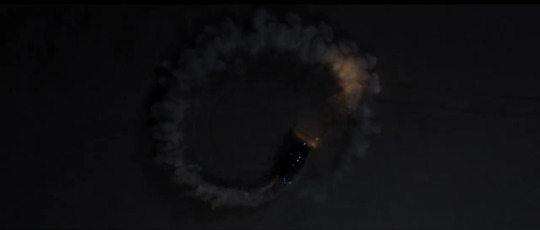
While at the party, Jack asks Alice if she’d like to go for a drive. I vaguely remember they’re teased for leaving but it’s expected since they can’t keep their hands off each other. Harry and Florence had a very easy chemistry that made their scenes believable and I think you can see that in the trailer, especially in the opening when they’re laughing and holding each other. There was a quick cut from the part to the two in the desert in their car. Jack is spinning the car in circles while Alice is laughing and screaming.

The next scenes showing Alice in a Jack’s white buttoned down shirt are right after. We get a quick montage to establish this is the routine the wives and their husbands go through everyday. You see Olivia’s character Betty also waving to her husband in their driveway as he leaves. They’re the neighbors of Alice and Jack. Alice is the only one dressed so scandalously, again continuing on with the theme of young lovebirds without a care in the world. I also remember Betty commenting on this. She comes across more sarcastic and teasing than the other women in their friend group, she’s always smoking or she has a drink.

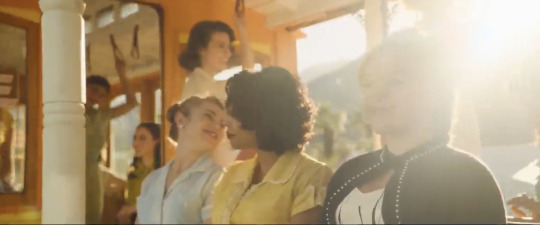

When the men go off to their mysterious jobs, the women go into town via this shuttle that takes them back and forth through the desert into the shops where they have lunch, gossip, go to their ballet class, etc. You get the impression this is what they do every day. They don’t work just socialize.
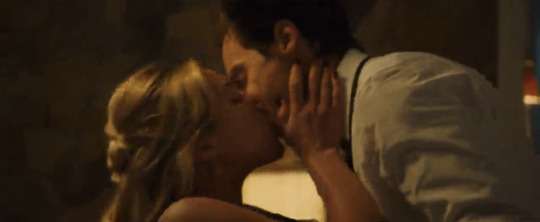
That night when Jack gets home from work, Alice greets him in the doorway with a drink and tells him she made dinner. I don’t remember the dialogue exactly but it doesn’t take too long before he begins to kiss her and push her back until she’s laying back on their dining table. His head goes under her skirt and there’s a shot of Alice’s face while he goes down on her.

There is no nudity in the movie and this is probably as explicit as it gets.


There was a weird cut here that I hope they fixed because the party happens the next day maybe but I wasn’t sure about the passage of time. Right before we get into this backyard party scene with the majority of the cast, there is a scene with Alice and Betty where they’re gossiping and I remember Betty having another line about Alice and Jack always being all over each other. She asks about kids but Alice says they don’t want that right now. Again, I unfortunately don’t remember the exact dialogue anymore but the gist of the conversation is Betty agreeing with Alice about not having children because they’re annoying. Betty has a son and daughter of her own.
During the actual gathering, you see it’s meant to be a sort of company party being held by Frank and Shelley who are married (played by Chris Pine and Gemma Chan). The voiceover in the trailer during these scenes is the speech Frank is giving to all the people in attendance. Betty responds easily to Frank which led me to think she’s been there for awhile or her and her husband’s loyalty is very strong, in any case.
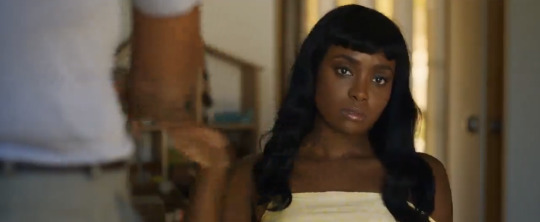
Margaret is introduced, played by Kiki Layne. She has an outburst while Frank is speaking that startles everyone so her husband takes her aside and apologizes for her interruption. Betty makes another comment here, I don’t think she’s meant to be very likeable. Alice begins to take notice that something seems off.
We find out Margaret’s son has gone missing and there’s a rumor she took him out into the desert and did something to him herself.

This scene is meant to be Margaret, her son and his toy airplane.
It’s a flashback that happens so we get a little more understanding about why Margaret is acting so strangely.
Once Margaret’s husband takes her aside and away from the gathering, Jack once again asks Alice if she wants to be alone.
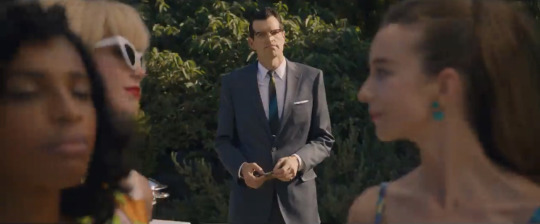
Almost forgot to mention. This man is seen there but we don’t find out who he is until a little bit later. It turns out he’s a “doctor” that’s called upon to treat the wives when they start acting hysterical.

This is the scene in the trailer where they go into the house and find a room where they once again begin to kiss and Jack gets his hand under her skirt. Frank enters and watches them for a bit, Alice sees him but doesn’t stop Jack.

Back to this. New day, same routine. Except now we have the weirdness with Margaret and Frank so the cracks are starting to show.

While on her way on the shuttle, Alice sees a red plane that resembles the toy plane we saw in the flashback with Margaret and her son. As Alice watches the plane, it crashes and she of course freaks out. She demands the driver take her out to the crash site to see if there are any survivors but the driver declines by telling her he only goes into town and to their neighborhood. Alice is completely distraught and won’t take no for an answer so she gets off and starts walking in the desert by herself to hopefully get to anyone at the crash.


I don’t remember the significance of the plane being revealed at all. I do remember that the disappearance of Margaret’s son is brushed off in a really strange way. It felt like a plot point that was shoehorned in last minute to give Margaret a reason to do what she does later but no one shows any real concern that a child has gone missing in their small town.
Alice doesn’t find the plane but she does see this dome-like structure at the top of a hill that seems completely out of place. she makes her way up to investigate. You can see in the first pic from the trailer, she’s sweaty and exhausted from walking all that way in the heat.She puts her face against the glass and loses consciousness.


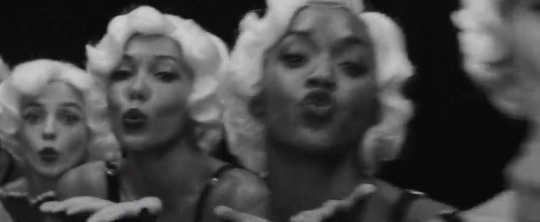
She has visions of being underwater, being groped by people in black rubber suits, a dilating pupil, and these burlesque dancers.They cut in and out throughout the movie so you see each vision more than once, especially when she really starts to unravel what’s going on.

I didn’t see the next scene in the trailer but when Alice wakes up, she’s back at home and Jack is cooking dinner for her in the kitchen (the photo above is from set, but it’s what he’s wearing in the scene). He’s messing everything up and tells her he’s completely useless but he just wanted her to rest while he took care of her. Alice tries to tell him what she saw but he dismisses it.
He brushes off Alice’s worries and tells her it wasn’t possible she saw a plane go down. The gaslighting is intense from here on out and her breaks with reality are more frequent.

There are a couple scenes in the ballet studio. Shelley (Gemma Chan) seems to be in charge here as she leads the class of women. In the very last still I posted, the woman with the pixie cut is Violet (I think she’s listed as Bunny on IMDB) played by Sydney Chandler. Her and her husband are new to the town so she joins the women here. There is really no development of her character apart from using her as a plot device to show how new members of the community are introduced. She has a look that’s very reminiscent of Mia Farrow in Rosemary’s Baby so her character seems interesting but it goes nowhere.
When Alice begins to have visions, one of them includes seeing Kiki Layne’s character smashing her head against the glass on the other side of the mirror in the ballet studio. Of course Alice reacts but no one else sees what she sees. Alice rushes home and this is where she sees Margaret on the roof.

Alice calls out to her, Margaret turns to face her then immediately takes a knife out and cuts her own throat and falls off the roof. Alice is grabbed by the men in red overalls to be taken away. I think they just take her back home. Okay, here’s where my memory is fuzzy. I don’t recall if Margaret’s death happens first or if these scenes where Alice is cleaning and having weird visions happens.
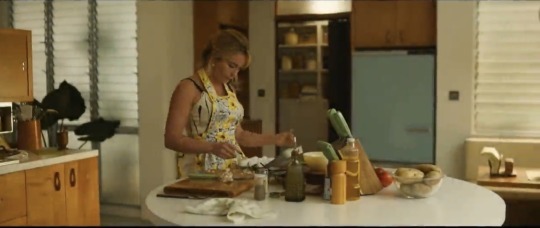
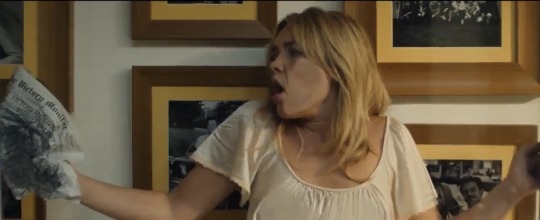
I think the egg scene happens the morning after the plane crash. And then she goes to ballet class and then Margaret’s death happensI remember Margaret dying early in the film and Kiki doesn’t have much screen time anyway.
The scene with Alice being pushed up against glass must happen after. There’s really not much more to it than she’s cleaning the window and the wall starts closing in behind her.
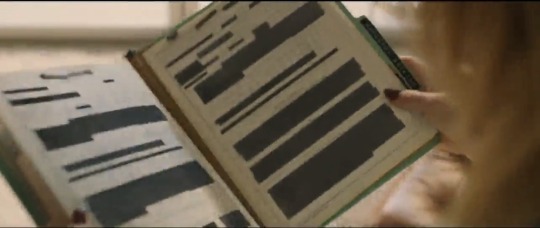
Jack calls for the doctor we saw at the company party to come see Alice. He tells her he’s worried about her, especially after what she saw and thinks it would be for the best. So the doctor does a house call and again, both he and Jack dismiss Alice’s concerns about Margaret and what she saw in the desert.
While Jack and the doctor step aside to further discuss Alice’s condition, Alice sees a folder in the doctor’s bag that has Margaret’s name on it. Why the doctor is just walking around with another patient’s file? I’m not sure, they just once again needed something to further the plot along.
The still above is the folder Alice sneaks out of the doctor’s bag. I don’t think she finds out anything interesting, at least nothing that was memorable.

The women continue to through their routine but Alice is becoming more unsettled. While they’re sitting in a shop, they hear a boom and Betty has the line in the trailer about the men getting work done. The woman in the still above is Kate Berlant who I recall being Bunny in the film. I went back to my initial messages I sent you when I got out of the film and you shared another friend that went and also said her name is Bunny so I’m thinking we got that one right. She’s pregnant throughout the movie so her character is meant to show the purpose of the wives.
There’s a big gathering coming up, I really don’t remember the purpose of it. It looks like a New Years Eve party but it ends up being a formal company party with a quick champagne glass strip tease from Dita Von Teese. Right before, Alice and Jack are getting ready for the event with Alice in the tub and Jack getting dressed in their bedroom. They’re talking and suddenly Jack pops his head in and says they should have a baby.

Alice is completely taken by surprise since she’s told the women already that they don’t have plans for that now. She is left speechless, Jack completely clueless while he goes back to getting dressed. She sinks down into the water because this is yet another weird thing that’s come up. And from the trailer you can see her reflection doesn’t move even though she does.
This is something I didn’t understand. The film wants the audience to feel as unhinged and disturbed as Alice feels but the whole premise of the movie is that they’re in a simulation. So why are these moments allowed to happen? Is the program that flawed? It obviously happens often, we have to assume Margaret is not the first to do something drastic.
This wasn’t clear because the Victory program itself doesn’t get a backstory. I had this frustration through the end of the movie even after the twist is revealed. I didn’t get a lot of substance.
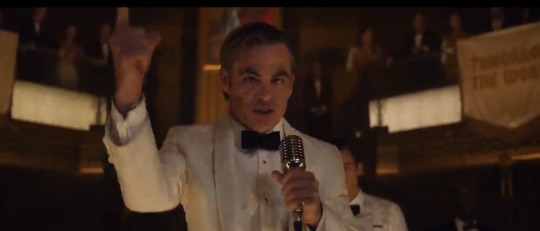

At the party, Alice tells Jack she wants to go home but he tells her they have to stay for Frank. It’s a very glamorous event, but again it seems to just be a company party again?

This is where we get the quick strip from Dita Von Teese. If you’re familiar with her champagne glass routine, it was the same one. Nothing too exciting there. Alice starts to have a panic attack so she goes to the restroom and Betty is there. Alice starts telling her something is wrong, that she’s being lied to, that she saw a plane crash in the desert and Jack isn’t listening to her.
Meanwhile, Frank is leading everyone is a ‘Victory’ chant and he invites Jack up on stage. I really don’t understand the purpose of this except to humiliate him, but Frank orders Jack to dance for everyone.It’s a really uncomfortable moment that was edited to cut back and forth between Alice in hysterics and Jack dancing like he’s about to pass out.
I get that Frank is the manipulator of the program so he’s very literally making a puppet out of Jack. What I didn’t agree with is it confused my understanding of their intention for Jack. Does he regret doing this? Are they trying to make him sympathetic despite how he’s trapped his wife in a fake world with him?Should I be feeling sorry for him despite his actions?
My feedback at the screening was I felt Jack’s motivation for his actions was incredibly weak. And thinking back on it now, I still feel that.
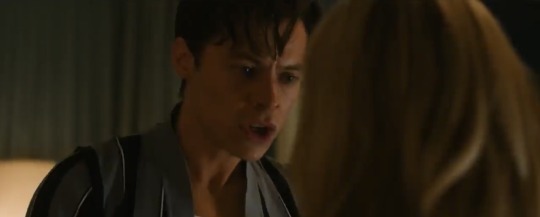
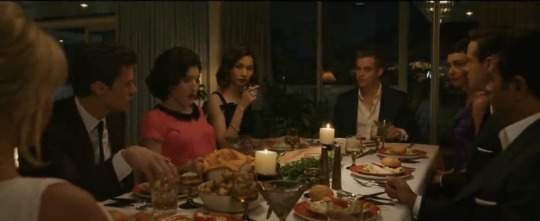
When Frank first arrives, he makes mention of seeing Alice and Jack in his house at the previous gathering. This gets her extremely angry and she doesn’t hold back either. They then have a very awkward dinner scene where Alice tries to expose Frank. When they sit down for dinner, Frank sits at one end and Jack goes to sit at the other head of the table but Alice cuts him off to sit there so she can square off with Frank. Jack then has to sit at one side which is why he looks upset in the trailer. And of course once Alice starts being very vocal about her concerns, he becomes humiliated.
This is where it goes into the montage of Jack signing up for the Victory program. There’s another voiceover from Frank explaining the purpose of the program. You get a really upsetting image of Alice chained to their bed while Jack goes back and forth between reality and the virtual world.
This isn’t explained either but the assumption is that when the men go to “work”, they’re still functioning in the real world. When Jack joins the simulation again, he lays down next to Alice who is covered in bruised and unresponsive.


We get back to the simulation and this is after Alice has been brainwashed of reprogrammed. She looks like she did before in her period dress and hairstyle.

Betty greets her and says everyone missed her. Alice says she’s feeling much better and then the cycle begins again with the Jack going to work and Alice remaining at home as the perfect wife. Maybe this was fixed in editing but this was my biggest issue with the film. I didn’t understand how much time was meant to pass from the time Alice returns and when she starts having her breaks again.
When I watched, it felt like she just got home. Jack gets home from work in the afternoon and then Alice starts remembering everything again. It was very rushed with no explanation as to why she has the ability to break through the simulations controls. 🤷🏻♀️
Alice and Jack argue and she rightfully accuses him of trapping her against her will. He grabs onto her and tells her he doesn’t want to lose her and he’s sorry but he starts squeezing too hard causing Alice to panic. She tries to get away but he won’t let go so she grabs a heavy glass nearby and slams it over his head until he lets go.
Betty comes in from next door. The assumption is she must’ve heard everything but that isn’t properly explained either, she kind of just bursts in. She sees Jack and this is where she reveals everything to Alice. She tells Alice that she needs to get away now that she’s killed Jack. She says that Jack is dead both in the simulation and in the real world. Though, again, that’s not explained. Why would someone dying in a virtual world kill them? She tells Alice she chose this life for herself and she apologizes for lying to her. Oh, I forgot to mention that at the dinner before she was taken away, Frank told Alice that Betty told him everything Alice told her at the party.


Alice runs out of her home and the neighbors start coming out and circling her. If you remember, there was a leaked video from this exact moment when Alice is attempting to escape. The street lights burst around her, the color and sky around her start to glitch. It’s not explained why she has the power to affect everything. Or maybe it’s not her at all and the system is just reacting to a user being killed? More questions.
Alice gets into a car and races away into the desert.

I’m not sure why she understands she has to go back to the dome at the top of the hill. It’s mysterious and seems to have some sort of tie to the workings of the simulation but that is never explained either.

Shelley is at home when Frank gets the call about what’s happened. He starts to order people to capture Alice before she can escape but Shelley stabs and kills him. Maybe to help Alice get away? So she must know what’s actually going on. But again, I had to connect a lot of dots myself. I don’t remember if Gemma had dialogue there but she was present at the dinner so she knows how Alice feels. That’s my best guess, she must know. Maybe she created the simulation with Frank? That would’ve been interesting to explore or reveal.
My question was: escape where?

Alice crashes the car halfway up the hill so she has to run up the rest of the way.

And she’s being pursued very closely. But she does make it up the hill and to the dome, just like she did the day she saw the plane crash. She has another vision of Jack who hugs her from behind. And he says the “always me and you” line while wearing that sweater I told you I don’t understand. 😂
But she steps forward right before the men get to her. You get a shot straight on of Alice’s face (which you can see on Olivia’a IG) and then it goes to black and you hear Alice take a deep breath.So the assumption is she woke up in the real world, I think. [of course, she’s meant to be in a coma in the real world, but who cares about closing lot holes or major details like that?].
This is why people, myself included, found the ending confusing. It’s rushed, as I said, and there’s no explanation as to why or how she escapes the virtual world.
I really didn’t like that they added that strange image of Jack hugging her at the end. Unless that was the simulation trying to stop her? [Were you supposed to feel sorry for him? Think he really loved her?] That’s what didn’t sit well with me. There were moments, like Jack looking uncomfortable while dancing or crying in the car, where I had that same thought. Are we supposed to sympathize with this person? Why??
Also keep in mind the version I saw was about 2hrs long. But it sounds like it may be about 90mins from the more recent screening since the person mentioned it was shorter than they thought it would be. That’s probably for the best. I didn’t see anything in the trailer that was new from what I saw. The coloring was improved, but that was the only notable difference.
DWD does not have a strong script, it benefits from Libatique’s cinematography. So the trailer looks very pretty. The song you hear is what Alice sings throughout the movie. She hums it in the teaser too. But it just looks pretty. Maybe cutting it down made it feel more coherent. We’ll know when it leaks.
#don't worry darling spoilers#don't worry darling#don't worry darling screening#don't worry darling trailer#abuse tw#murder tw
650 notes
·
View notes
Text
Voted for other so gonna explain. I want to preface since you mentioned it, if you like it that is completely valid, please don't take this as an attack I don't mean that in the slightest.
The main reason I dislike Phantom Planet is honestly a mixture of all these options and then some. I already have mixed feelings on S3 in general, mainly from the characterization, the plot point dropping, introducing new concepts to never use them again, the Sam and Danny romance being poorly done and put in every ep, and more. To be honest, I only really truly enjoy 'Eye For An Eye' and 'De-Stabilized'. PP for me honestly felt like the culmination of every issue I had with S3 all come together.
First things first I don't like the Disasteroid, I may of been more fine with it had it been something maybe hinted or foreshadowed in earlier episodes, but it comes out of nowhere and is pretty weak for a big finale villain esp in comparison to the other specials like Reign Storm, The Ultimate Enemy, and Reality Trip (yes I know Urban Jungle but tbh that's just a 22 minute episode they advertised as a big special). Plus the whole thing of Ecto-ranium I don't care for.
Next, I hate the characterization in this episode. Danny giving up his powers makes no sense after all the growth he's gone through. Had they made it maybe he gets pushed to his brink with those he cares about getting put in trouble/danger that would be one thing and would fit, but for the main focus to be on people not paying attn to him and then being mad his parents were in trouble making him decide to do it immediately is just ???
Sam, Tucker, and Jazz are really bad here too, they just don't have Danny's back at all and honestly act as if they don't care for him now because he's "normal" especially Sam holy shit they did Sam so bad here. I get what they were trying to go for with her speech to him, that being how he took it upon himself to help others and to give up so easily is not him and such, but it's written so badly mixed with everything else that came before it that instead she comes off as only caring for him for the excitement it brought to her life and taking that away is horribly selfish on his half, completely disregarding his feelings. I honestly just hate how both sides are shown here, Danny feels so OOC to just give up so easily and the three are portrayed as only caring for him cause he's "different".
Vlad is done the worst here, I already have a big BIG problem with his portrayal in S3 (minus EFAE and D-S) which is a discussion in itself. To summarize, S3!Vlad to me felt very one dimensional. His whole character essentially becomes a generic "I want to take over the world" for whatever reason despite that never being his focus previously, his plans not having that same level of thought put into em like before, and they make him weirdly obsessed with his money? Like yes he's proud of his wealth but there was more to his character than that. That's just a quick summary though, PP takes all that and makes it ten times worse for me. The scene where he just reveals himself in front of everyone was so out of character, what happened to the calculating villian that manipulated others and normally had to be thrawted by outhinking him or taking advantage of his weaknesses, why is he openly revealing himself in front of everyone!!?? Why is he demanding 500 billion?? And then his ending fate is too fast, the Jack scene I like the idea of, but the context lead up to it makes it fall apart for me. If anything Vlad should've been the big bad here not a giant rock. After he's left in space, he's just done. No more impact on the plot.
Next next, I just don't like the story. It feels like Bitch Fuckman didn't know which plot to do (since he was the only writer for this ep) so he combined two in one. We spend the entire first half focusing on Master's Blaster and the second on the Disasteroid. A lot of time is spent meandering until we bring it up again. I already mentioned the characterization so not gonna go into that, instead I want to mention how characters like Valerie and Dani just do not get any screentime whatsoever, which for the former esp stings because D-S set up a new step for her character arc to take with her discovering the existence of Halfas. The way Danny loses his powers is too convient and the way he gets them back feels like such a deus ex machina. The plan itself to stop it from hitting Earth confuses me considering that they still have to be touched by the Disasteroid so what is turning the Earth intangible going to do?
And then the Danny reveal, in Reality Trip it was such a big deal for his identity to get revealed and I love how it was handled there. They showed that the consequences for EVERYONE knowing his secret is a bad thing, however his parents would still accept him in the end and that's what mattered to him. For him to reveal his identity to everyone seemed so idiotic considering this, and then the way they just all start clapping like damn is the Down With Cis bus about to show up too? Are we in Evangelion now? But yeah it just felt so poorly down and esp considering what could happen to him now esp with the GIW and other governments is just never addressed. Also why is Tucker mayor now 💀
Finally, PP leaves several plot points just never addressed. What's going on with Dani she's still out there, Valerie's character arc was never finished, the cliffhanger with Dan back in TUE, Vlad having possesion of Pariah Dark's ring and crown, and his deal he made with Fright Knight. None of these get addressed or brought up at all leaving them abandoned. Sam/Danny stuff is more a general S3 problem and I already mentioned why I didn't like how Sam was done in this ep, but I will admit him giving her the wedding ring and then treating this as so romantic made me laugh my ass off like bro y'all are fourteen calm the wedding bells down 💀💀
But yeah that's my main reasons why I really dislike PP and more often than not just tend to ignore it outside of AGIT's handling of it. Tho again this is no hate to you for enjoying this episode, it's good you found the positives and things you genuinely enjoyed about it.
I want to understand people's hatred of Phantom Planet more as someone who enjoyed it so I've asked some people their reasons. Honestly all of them made sense!
I want to see if the rest of the phandom agrees or has different reasons entirely so I made a poll:
And of course you can go in depth in comments/reblogs/tags! I encourage it actually!!
It just feels like this episode has become taboo for fans and I want to understand why
122 notes
·
View notes